Thursday, September 5, 2013
Friday, August 23, 2013
The Garden of Seven Gates at The Small Farm Training Center
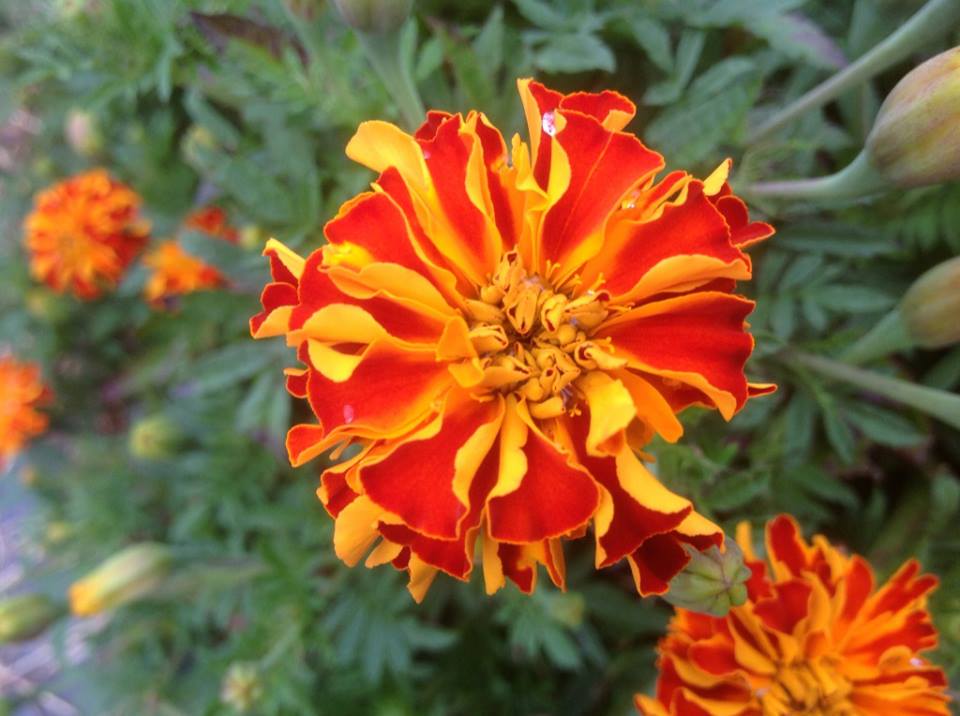
When I tell folks that my main course of study at Union Theological Seminary in the city of New York is eco-theology, I get either knowing nods or quizzical looks. In either case, it doesn't take much explanation to show that the Earth and the Divine are inherently connected, that you cannot have one without the other. As I have spent my summer getting the soil that sustains me firmly lodged in my fingernails and pores, I have been pleasantly surprised to see and feel that a calling to the service of the Earth may indeed be my calling as a service to God. My case of nature-deficit disorder may not be as severe as I first thought. I am more convinced than ever that to work and create earth-centered ecologically-sound communities and local food cultures, grounded in the timeless wisdom of ancient spiritual tradition, is the most vital justice work of our time and also the true spiritual revolution of our time.
On the surface, The Small Farm Training Center (SFTC), and its leading farm-hand Terry Sheldon, are offering a vital example of local eco-conscious community and food culture, but befitting Terry's decades-long immersion in the Vedic spiritual tradition, and the practice of bhakti-yoga, the SFTC is, at its essence, a reflection and practice of humanity's most original and natural connection to the Earth and to the Divine. On the SFTC website, Terry explains the Vedic ecology at the core of the SFTC:
"There exists a deep ecological tradition in Vedic culture by which human settlement, forests and water resources are carefully balanced. To achieve that balance, nature's welfare and human welfare cannot be separated each other. For this reason Vedic ecology teaches that the earth and the cow are to be loved and cared for as mothers. As such, culture -- including the cultivating of land for crops -- is an outward expression of spirituality. As a painting expresses the spirit of the artist, culture expresses the spirit of society. Vedic culture has lasted for many thousands of years and is still visible even today. It's a way of life that's lasts forever, is self perpetuating and regenerating."
Terry further explains that the heart of his work with the SFTC, in helping people of all colors, kinds, and classes to become "paradigm warriors" for the shift from our unsustainable corporatized-industrialized civilizational model to a sustainable Earth-centered model, is hands-on education with deep wisdom:
"Whether you're reading the sagacious words of Wendell Berry, or the biting commentary of Vandana Shiva, their conclusions are the same: The skills, aptitudes and attitudes that were necessary to industrialize the Earth are not the same as those that are needed now to heal the Earth, or to build durable economies and good communities.
We agree wholeheartedly... but our analysis goes one layer deeper to include the spiritual dimension. Without recognizing the role spirituality has traditionally played in preserving our planet's delicate web of life, we're easily tricked into believing that secular science will come-up with a green techno-fix to save the day. It's those brainy scientist types, not the sages of yore who deserve our veneration, so goes conventional thought.If Western education has driven the planet to a point of crises, what is wrong with that education? And secondly, can any current Western educational institution -- whether it's orientation is secular or Judeo-Christian -- identify what's gone wrong and offer courageous or inspired leadership?What's needed is not more education but education tempered with wisdom--education the teaches the value of local, the interconnectedness of everything, cooperation over competition and conscience over efficiency. Let's do an about-face. Is there a model that can dismantle the scaffolding of ideas, philosophies and ideologies that constitutes the modern world view? Let's look to the East."
Eight core tenets of sustainable development, including cow protection, vegetarianism, understanding of karma, understanding the myths of modern education, and devotion to food independence, are the foundation of the SFTC. It is these tenets at the heart of Terry's vision of "no-harm" farming and the real understanding of sustainability.
The SFTC is a living example of a no-harm mini-farm which is attempting to rewrite the landscape of eco-conscious community and local food culture in the hills of West Virginia. The "coming food revolution" that the SFTC wants to help create includes reciprocal links to networks of urban-based community gardens in schoolyards, low-income housing projects and the spaces left behind in the food desert. Terry writes that:
"No-Harm Mini-Farms will focus on food varieties that stress plant-based diets and plant-based protein sources, including milk from a resurgent family-owned dairy industry. Domesticated farm animals-especially cows-will reappear as welcomed additions to the rural and urban landscape. Animals will be protected and valued as co-authors in the revival of cereal grain production and soil fertility renewal."
For the denizens and the tillers of the SFTC, sustainability is more than just about living in the material world. The cultivation of the Garden is also a cultivation of the garden of the heart, of the soul's journey towards self-realization in loving relation to the Divine. Real sustainability, according to Terry, has as its foundation the understanding of the karmic fabric that ties all life together. The farmer, and all other living entities who work with her, must see their work with the soil as a divine service. All the energies of the work being done, if offered for the pleasure of the Divine and all living beings, if done with as little harm as possible (which excludes raising animals for slaughter), insures not only material but spiritual health, wealth, and evolution.
Terry explains:
"The real future of this whole thing is village life, where we develop ways to communicate and entertain and grow our own food, raise our children, educate, that is so location specific that it works. You develop loving, interdependent relationships with people, mutually interdependent relationships. That's our background actually. That's where were all actually coming from. That's what we're all looking for.
Defining relationships in this universe that are not competitive. They're cooperative. They're interdependent.The fact is that we're divine in origin. We are spirit souls. We are not bodies. We need a farming system and a philosophy that drives that farming system that recognizes the position of the soul and revers it as sacred. You're not completely non-violent, but it means how and when that violence is enacted. Its done very carefully.Beyond being vegetarian is making a sacrament of your food, and in the Hare Krishna Movement this is called taking, or honoring prasadam. You re still karmically accountable for vegetables that are killed Its not as severe, but its there. You're taking life to maintain your life. How do you get out of that? I need to eat, but it always involves taking life. The way out is to make sacrament of the food. To take it from a source that's acceptable to be offered and the mentality, the consciousness of how you grow it, harvest it, store it, how you cook it, serve it, is done in spiritual consciousness. This is called honoring prasadam.It is honoring the arrangement of nature by which all these things are given to us graciously for our sustenance so we can get on with our real business, which is self-realization."
Let me take you on a short tour of the Garden of Seven Gates, the beautiful centerpiece of the Small Farm Training Center in Moundsville, W. Va.
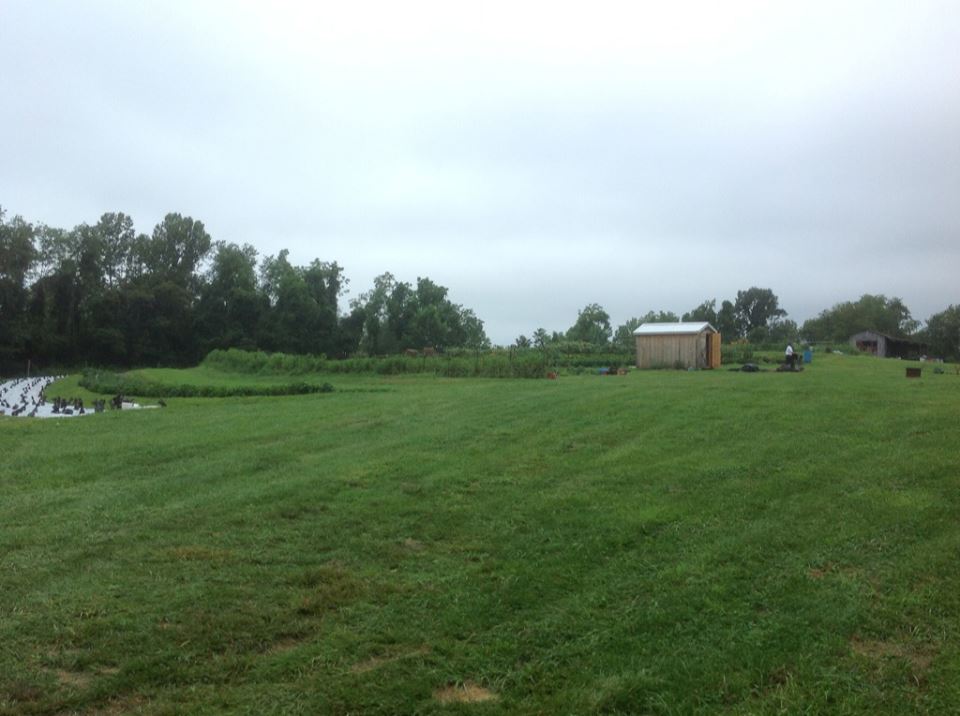
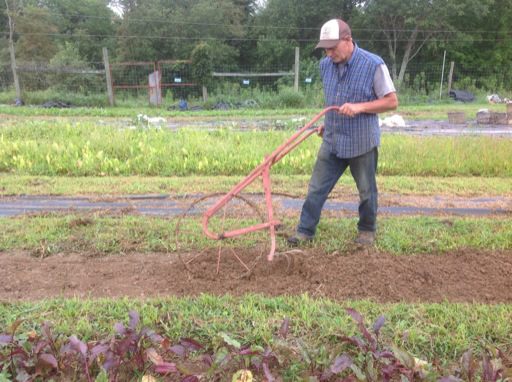
The Garden of Seven Gates is a certified organic project at the forefront of the local food revolution. The Garden and its tillers produce a diversity of succulent and sanctified foodstuffs for the local New Vrindaban Krishna Consciousness community. It is also the flagship farm behind the vibrant environmental/food justice works of the Green Wheeling Initiative.
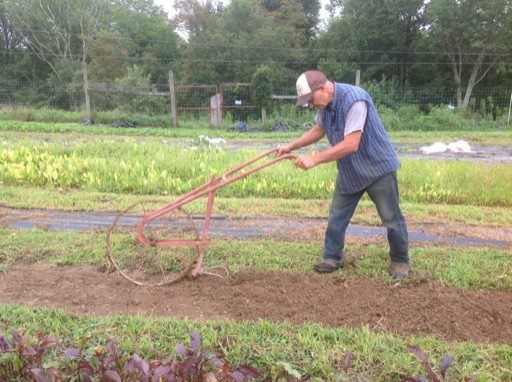
Here Terry Sheldon, head tiller of the Garden, here uses a traditional hand-tiller to prepare a bed for a hopeful new crop of string-beans. The ethic behind the Garden is hand and heart power creating food which itself will create justice and enlightenment for the local community.
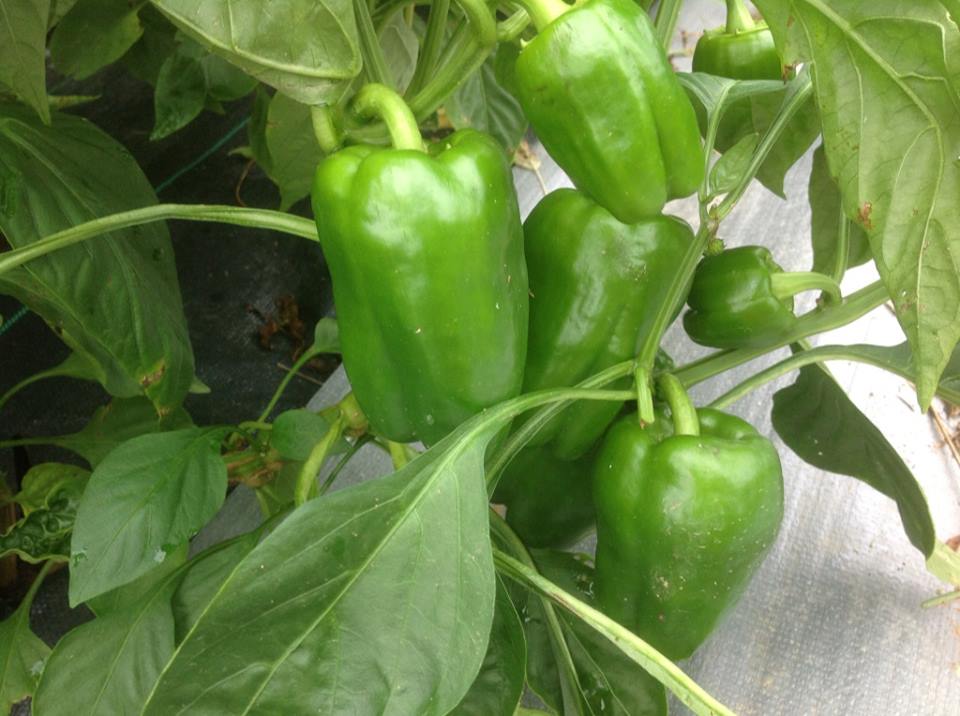
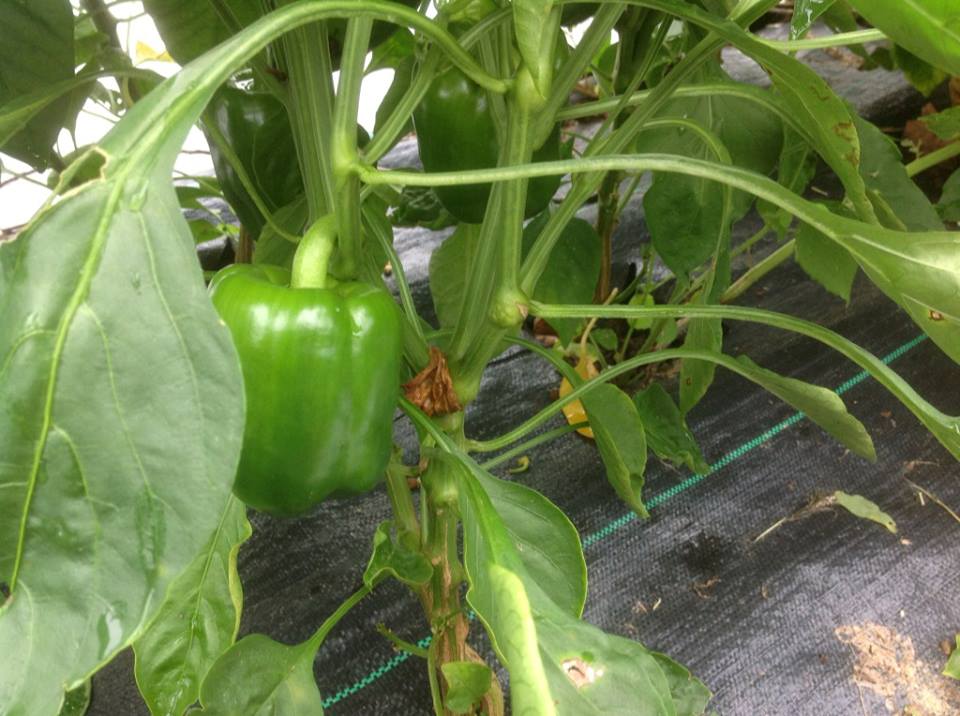
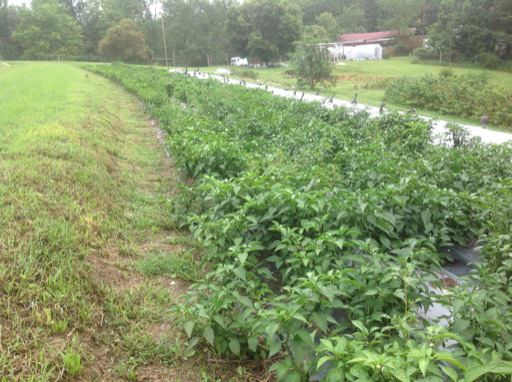
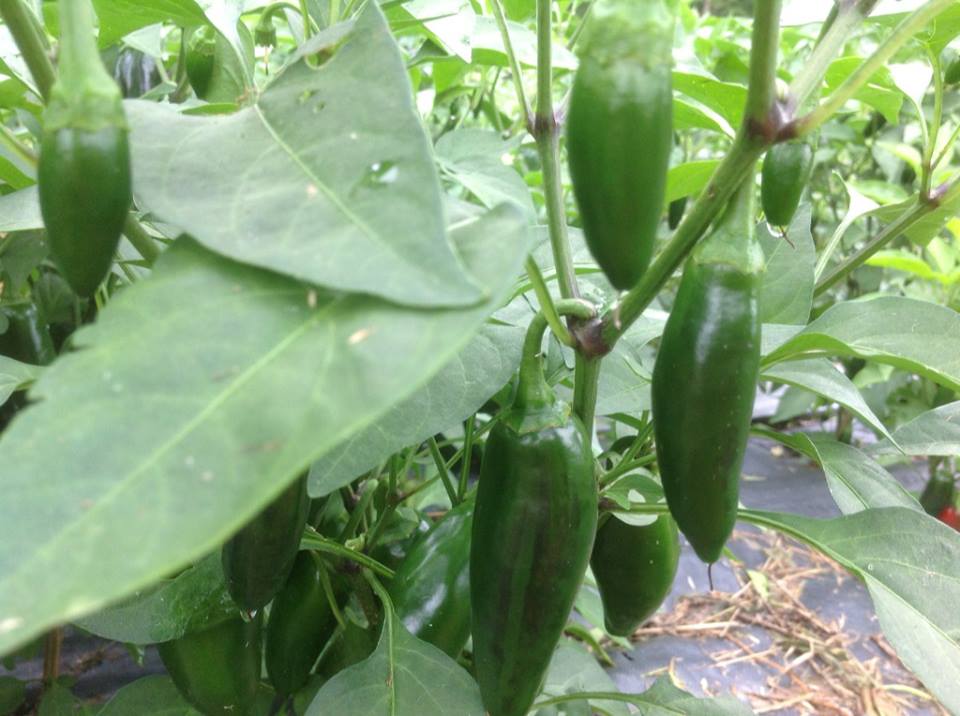
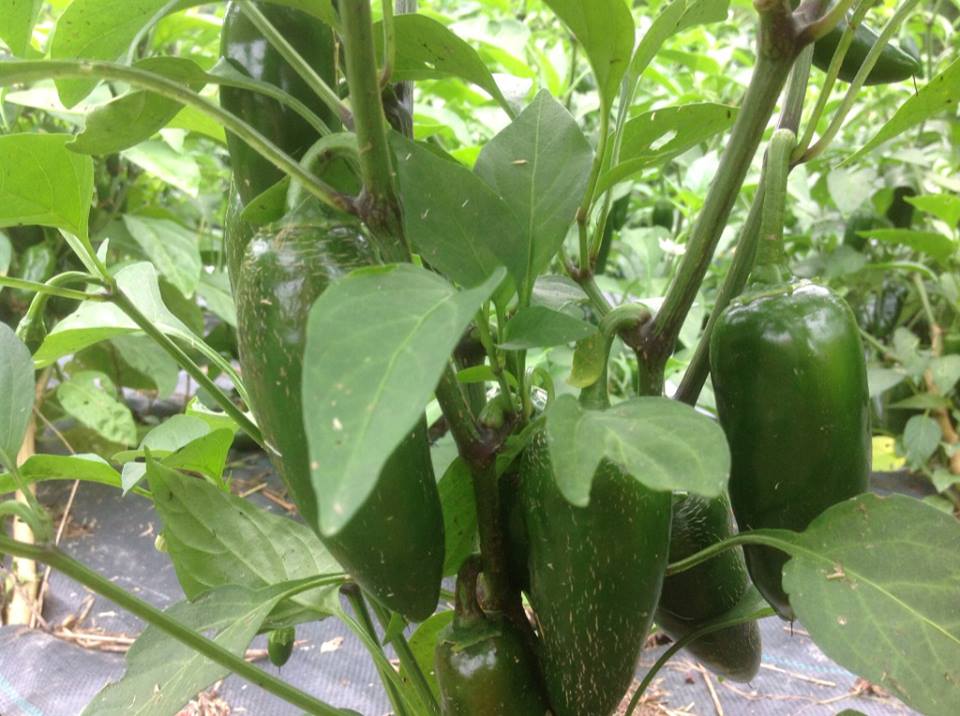
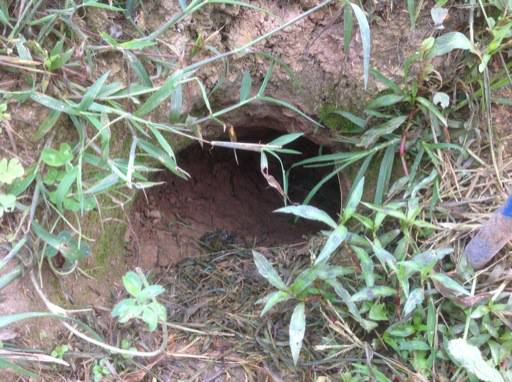
The hole leading to the lair of the groundhog, the adorable yet inconsiderate creature who can't control his tongue in relation to the Garden's edibles. A remake of the cinematic classic Caddyshack is currently being filmed on the premises.
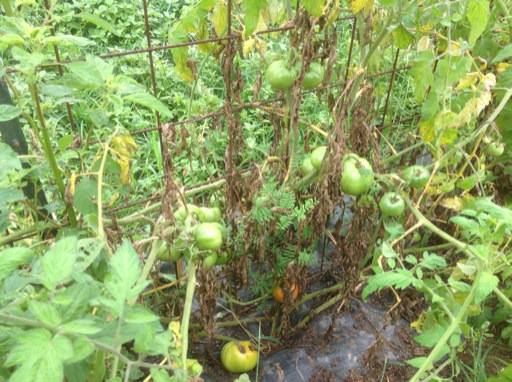
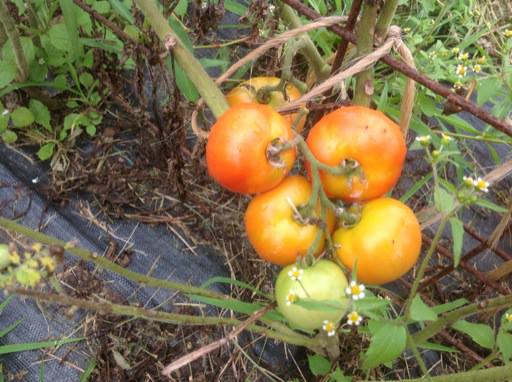
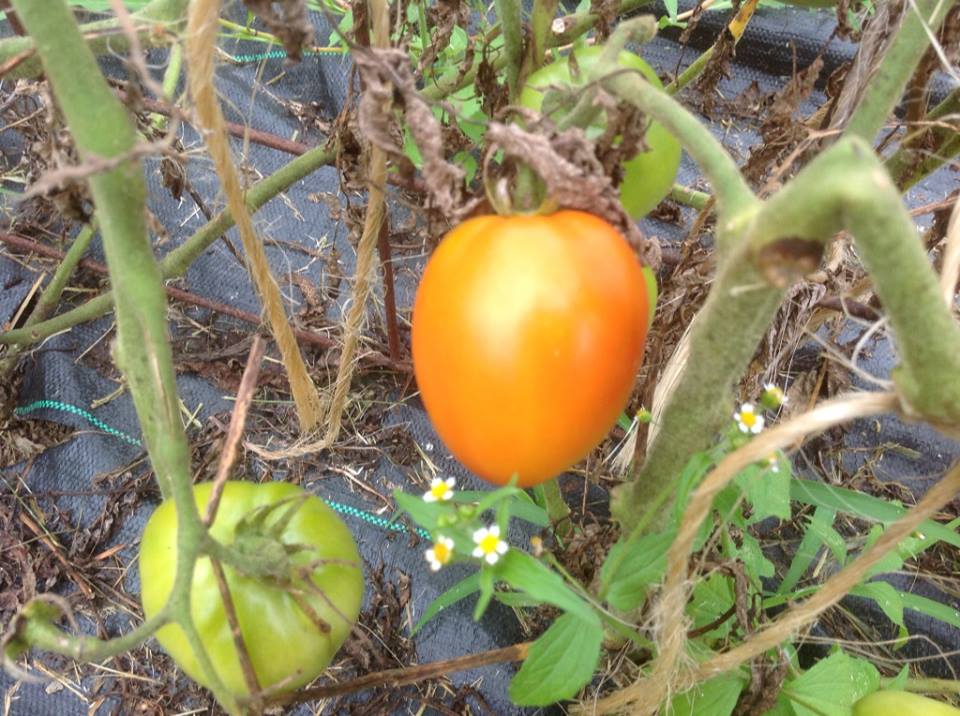
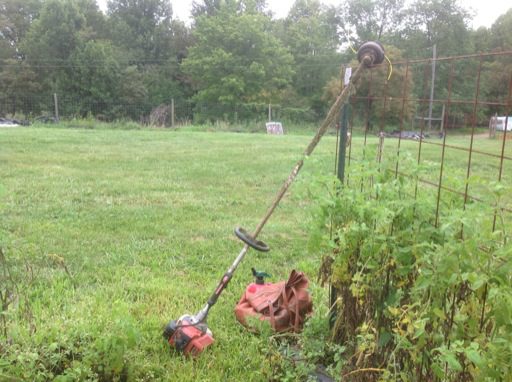
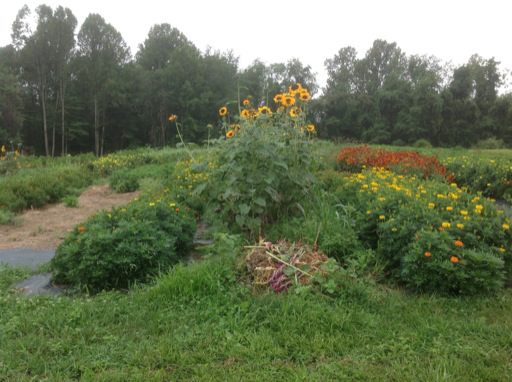
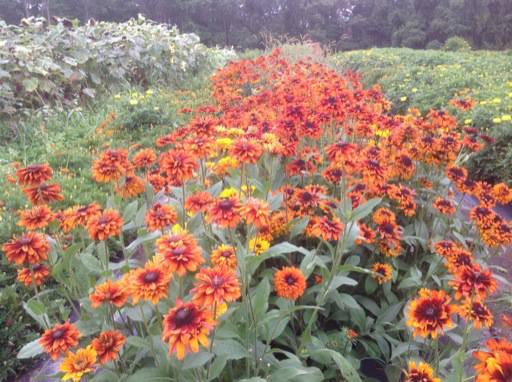
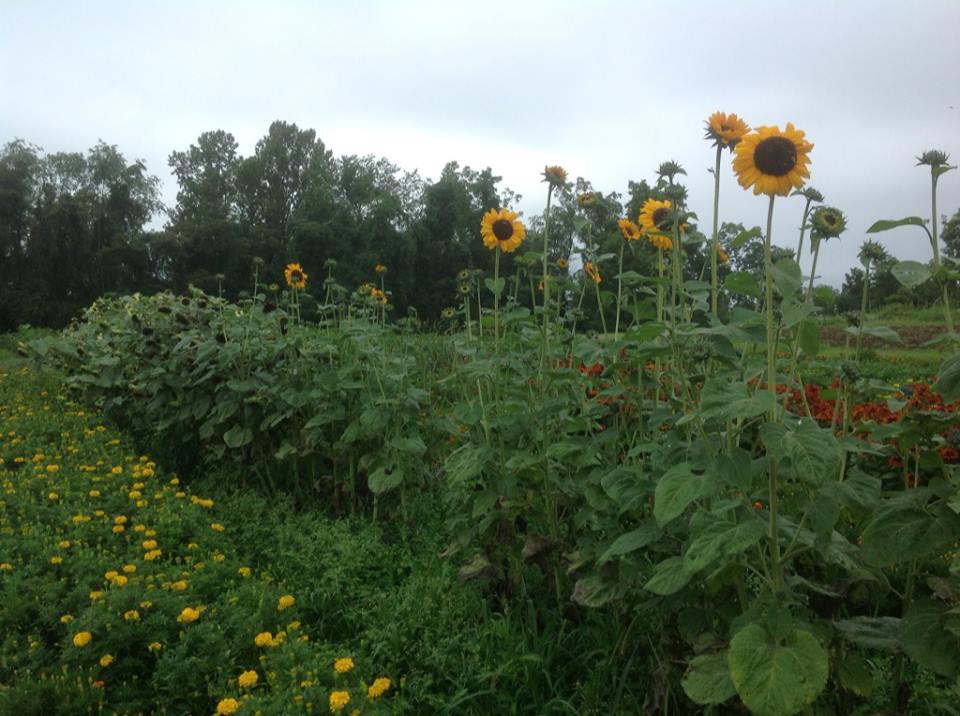
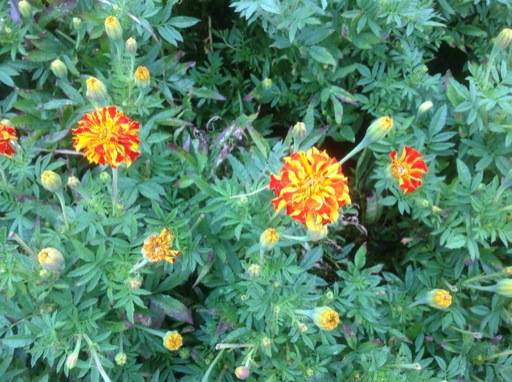
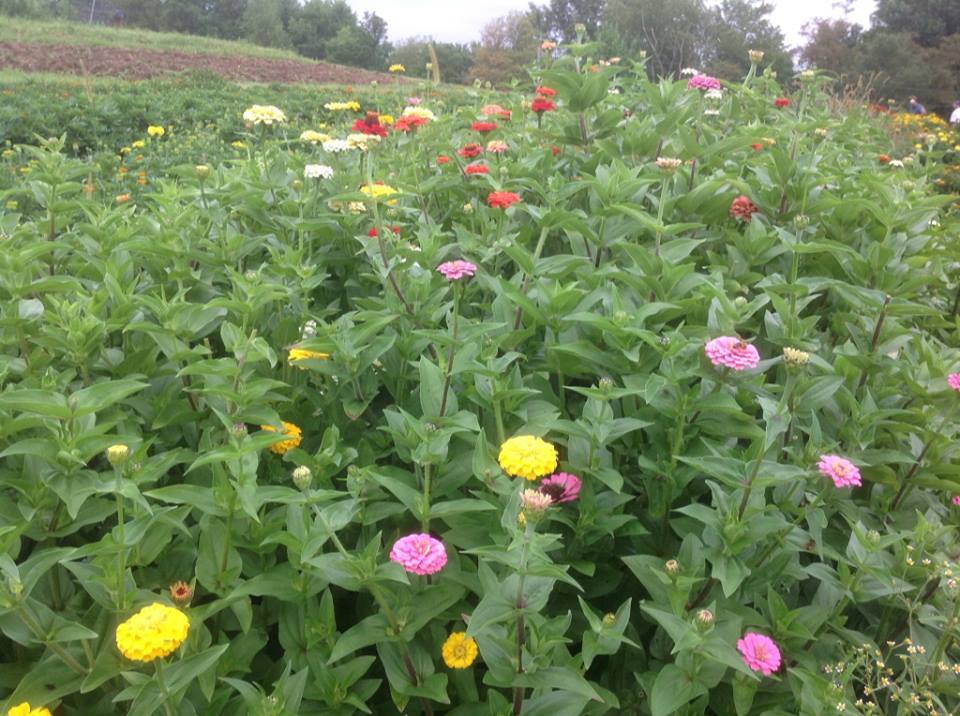
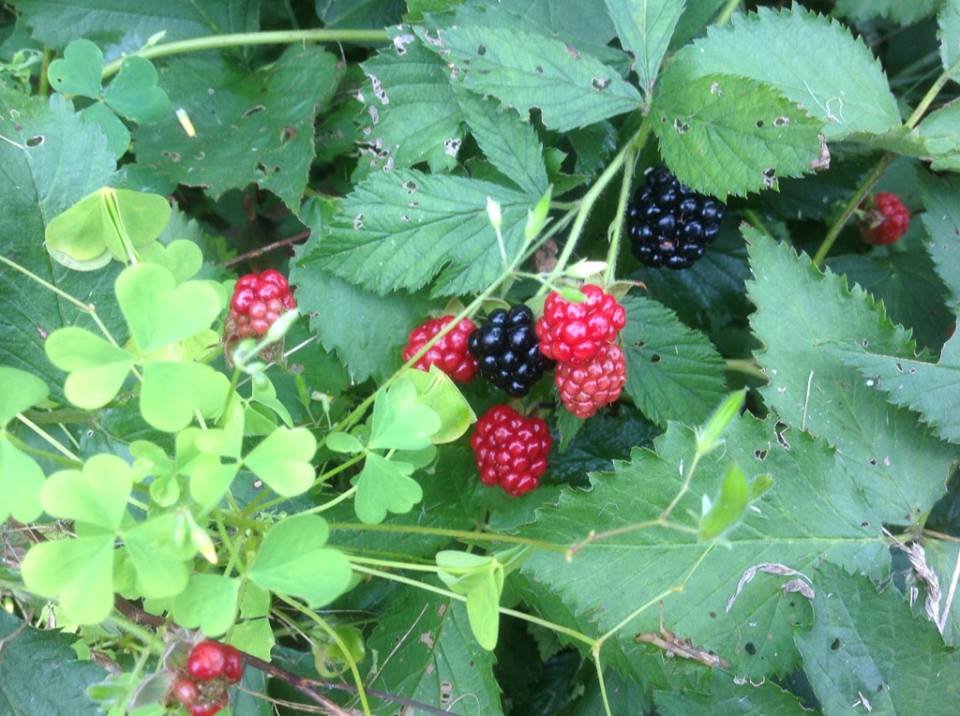
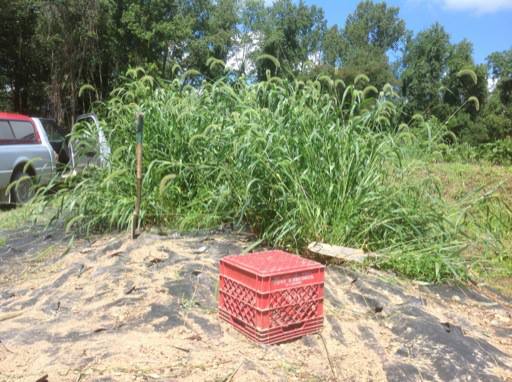
This was the Summer of Weed (not the happy kind necessarily). In order to clear this row to plant a late batch of winter squash, Terry and I spent nearly 8 hours hand-weeding nearly 200 feet of these ginormous weeds.
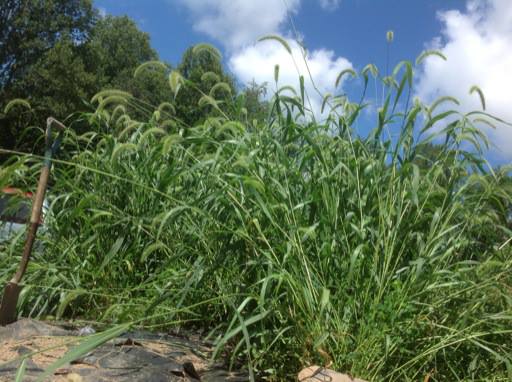
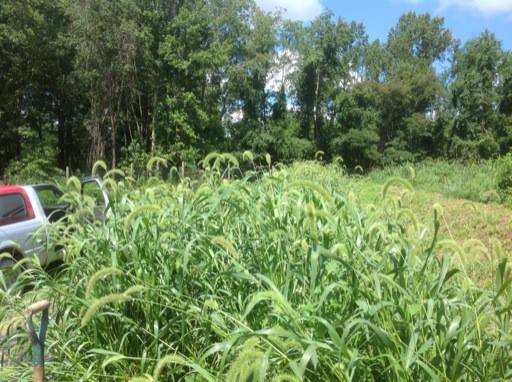
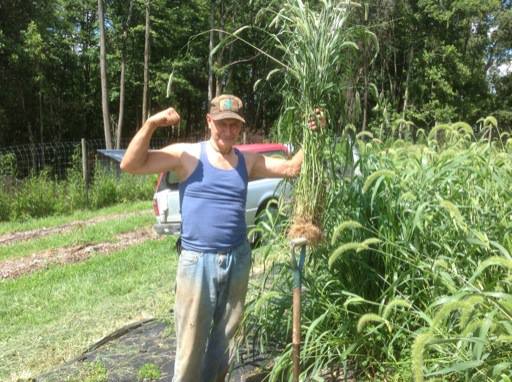
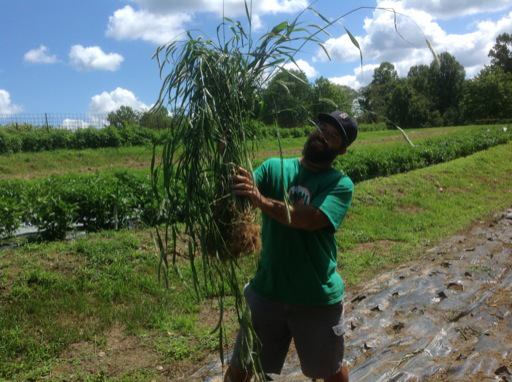
I've become delirious with fatigue dealing with weeds ten times my size, with roots several hundred feet deep, or at least it felt that way.
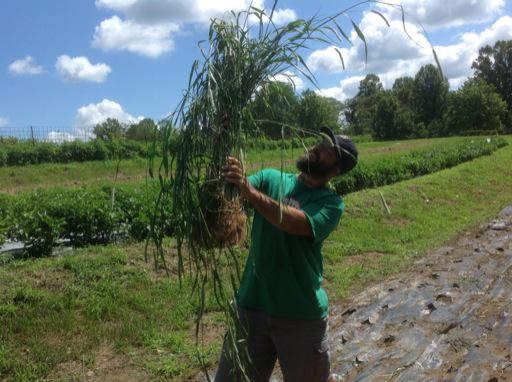
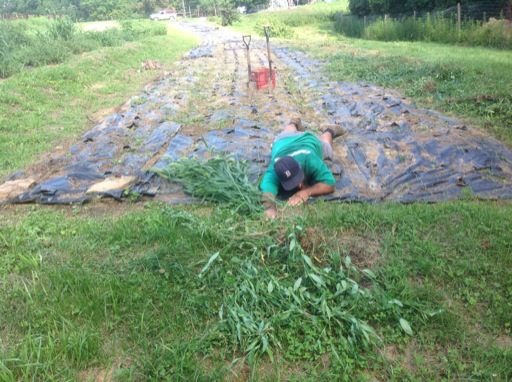
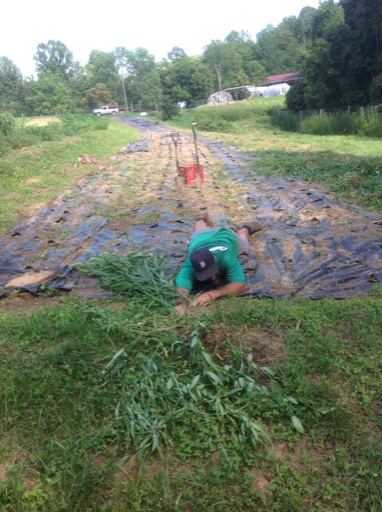
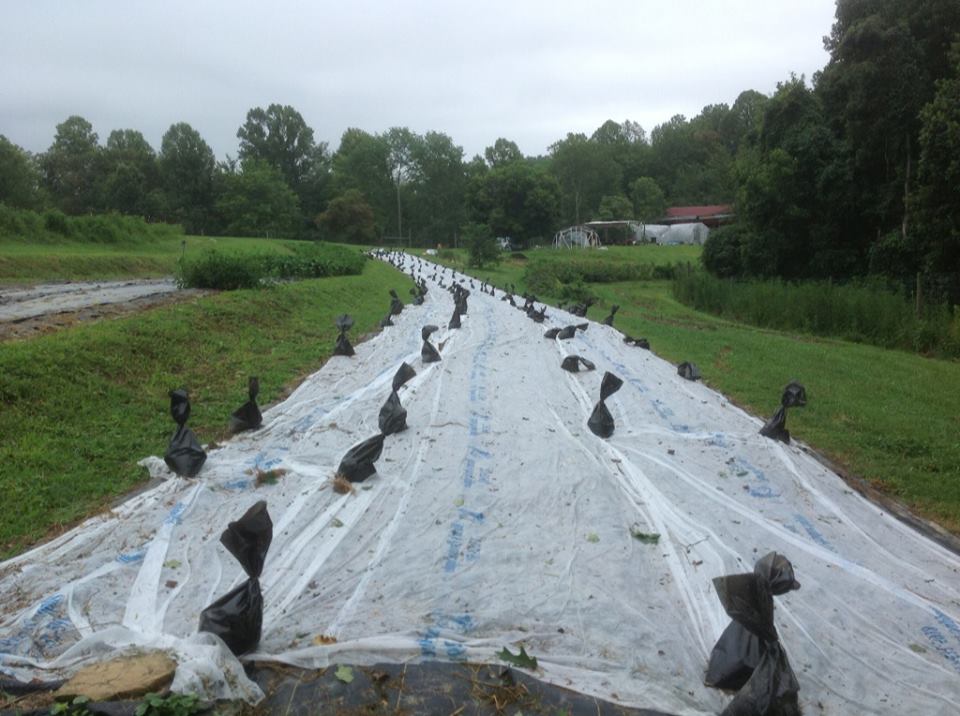
The weeded patch now planted with winter squash topped with row cover to keep the elements and damned groundhogs from getting too rowdy.
The Teaching Garden at The Small Farm Training Center
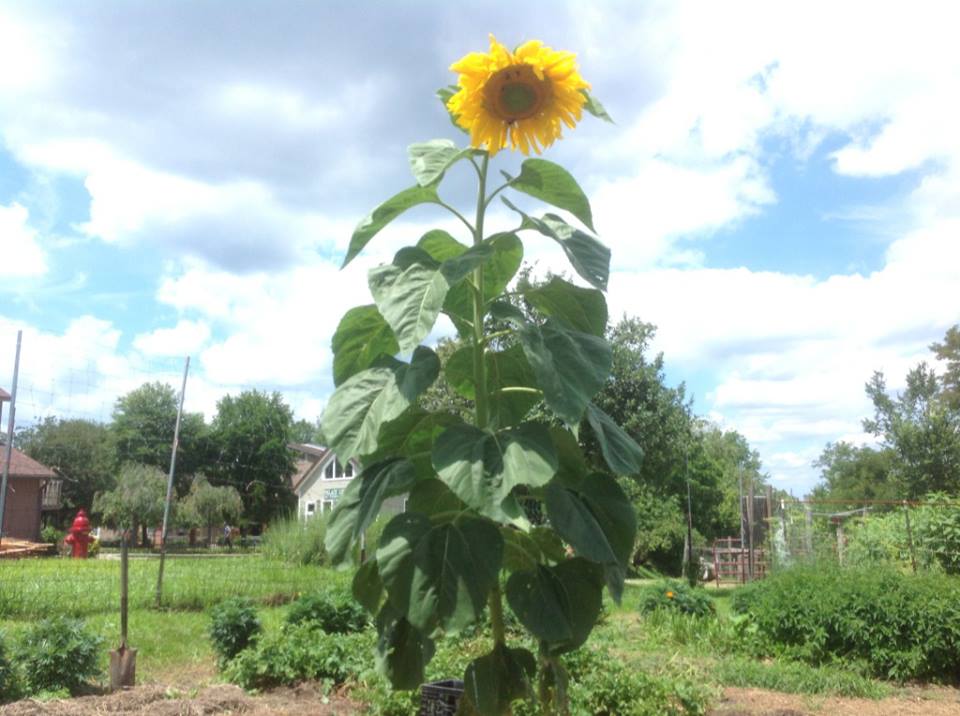
In a previous blog exactly a year ago here on HuffPost, I shared the philosophy of "simple living and high thinking" as presented by the eminent Vedic teacher/scholar A.C Bhaktivedanta Swami Prabhupada. In carrying the timeless wisdom of the bhakti-yoga tradition to the wide world outside of India, Swami Prabhupada was determined to create a profound paradigm shift that would carry our sense of civilization forward by harkening back to our natural foundation. This foundation not only consists of yogic practices designed to help us recover and restore the natural state of our being, as souls devoted to the Divine and all life, but it also consists of an ecologically-sound, agrarian way of life which in many ways is the polar opposite of the urbanized, industrialized, and technologized model of civilization we are deeply conditioned and committed to.
Swami Prabhupada dared to say that the agrarian model of life was not a backwards step. He wanted to us to understand that our reconnection to the simple life of the land was not only the most necessary forward step for our civilization, but also that it was the most necessary forward step on the journey towards our own spiritual self-realization.
Terry Sheldon, one of Swami Prabhupada's original students, has carried forward this aspect of Swami's misison with his service creating The Small Farm Training Center (SFTC), part of the New Vrindaban temple and community in the Northern Panhandle of West Virginia. The Small Farm Training Center is the flagship project of the Green Wheeling Initiative (which we have previously blogged about here and here). Terry has been at the cutting-edge of political and spiritual thought throughout his life, from the radical streets of Berkeley in the 1960s to the historic spread of the bhakti-yoga tradition across the Eastern and Western world. Now he shares the conviction and living example that the local food movement, and the paradigm shift towards ecologically-sound agrarian living, is the true and most essential earthly and spiritual revolution of our time.
From the Small Farm Training Center website, Terry writes:
The Small Farm Training Center (SFTC) is a land based educational center and a hands-on working organic farm. Our purpose is to create community -- a web of supportive relationships -- by making locally grown organic foods readily available and affordable with the use of simple technology.Although I've spent 30 plus years farming and gardening in Appalachia, I don't consider myself a "local." You might say I'm spoiled. My grandfather's farm in Northern Michigan, where I was raised, is both flat and fertile. West Virginia hillside farming is daunting. The soils here -- like the air, the streams and the people themselves -- have been used and abused for 150 years.The "real" locals, those who can trace their heritage back for two or three generations, love Appalachia. That spark of original mountain culture permeates their very being, Unfortunately, their bodies tell a different story. Morbid obesity and diabetes are the norm. That's the price you pay when you no longer grow what you eat and eat what you grow. Like most Americans, their industrially grown food is starving them nutritionally while fattening them for the "big round-up" by the pharmaceutical and health insurance industries.Something is out of balance. The Small Farm Training Center is one of many local organizations challenging this dying paradigm. We farm, we garden, we teach, we encourage, we improvise and most importantly we listen to input. We also call a spade a spade when it comes to identifying the political, economic, cultural and spiritual stumbling blocks to restoring the environment and securing a safe, stable food supply... We nourish both person and place.
For the past month I have been participating in the SFTC apprenticeship program with Terry and the SFTC. The program is a fountain of hands-on knowledge in relation to the ABCs of organic farming, biodiversity, composting, and the fine arts of constant sowing, seeding, and weeding. However there is an extra layer to how Terry approaches the idea of teaching and sharing. For him molding an apprentice means molding a paradigm warrior. He writes:
All privately held corporations are living a lie. They believe we live in a world where capital has the right to grow and that right is higher than the rights of people, If you're one of those people who passively accept corporate domination of America's food supply and political life, be forewarned, we don't. Corporations are no more a part of the natural order than the English monarchy was 200 years ago. They want us to believe that industrial agriculture is the only way to feed the world. That's a lie. They want us to believe that it is cheaper to destroy the earth than to take care if it in real time. That's another lie. At the heart of their economic system and theory is the proposal that life is too expensive. We disagree. We choose life and we're going to tell our own story. We're looking for paradigm warriors who can expand the conversation and are fluent in the language of inclusion, kinship and possibility.
The Small Farm Training Center apprenticeship program is about:
Learning by doing, and then teaching it to others -- that's how you earn your degree in bio-citizenship. Yoga, vegetarian cooking, and the care of farm animals -- especially milk cows -- are additional features of our curriculum. We also regularly distribute surplus organic veggies to soup kitchens and local charities. Turn off the boob-tube, shut down your laptop and pick up your hoe.
Being an apprentice here is about developing the courage to literally make the change happen, to be part of the global movement which draws us back to the foundations of natural community and civilization. It is about getting that sacred soil lodged in your fingernails and on your hands like a true badge of honor. It is about understanding the essential art of "no-harm" farming and the real definition of sustainability, as we'll discuss more in our next Yoga of Ecology blog.
For now, let me take you on a tour of one of the two gardens that make up the Small Farm Training Center. Today we will show you our Teaching Garden, and in our next blog we will check out our eight-acre Garden of Seven Gates. Join me!
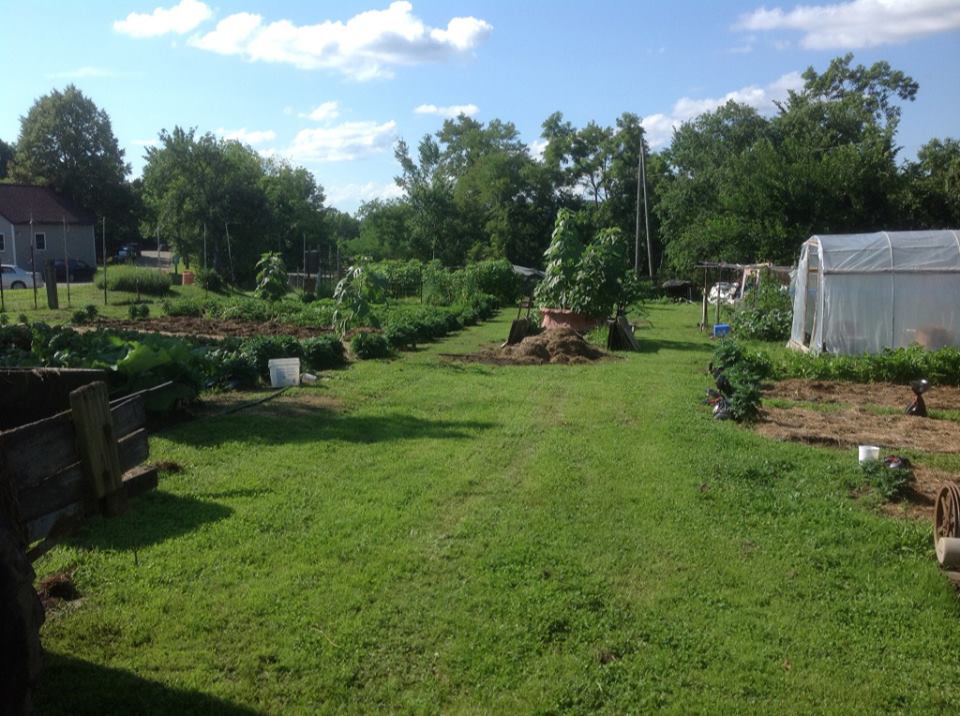
The 1/2 organic Teaching Garden provides foodstuffs and flowers for the New Vrindaban community and guests, for the sacred prasadam food offerings to the resident Deities Radha-Vrindaban Chandra, and for the outreach efforts of the Green Wheeling Initiative.
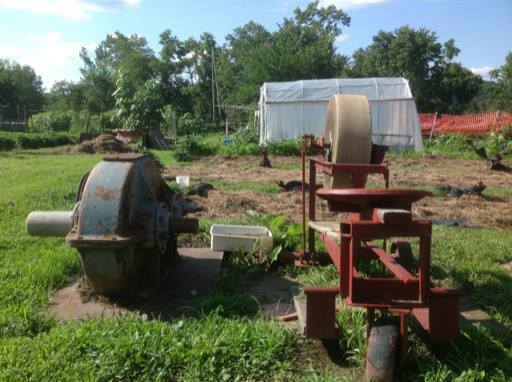
The Teaching Garden stands with feet in both new and old paradigms, honoring and participating in the progressive ecological movement of our time by showing an example of a cow-centered farm. The practical and philosophical aspects of the Garden are based on the principles of Vedic village ecology, from Indian culture, one of history and humanity's most advanced and ecologically sound systems of agriculture.
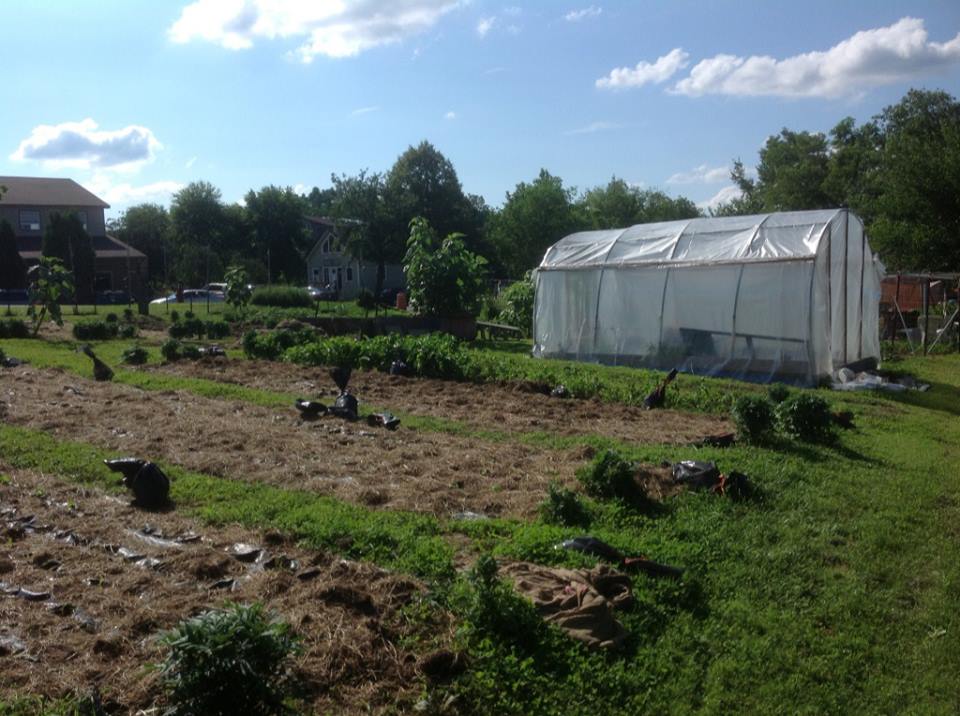
All fertilizer in the garden comes from the community's resident cows and goats, demonstrating that real fertility comes from living in harmony with our fellow living entities. The honoring and protection of our fellow animal community members is a deep and essential spiritual principle which insures karmic harmony and the sustainability and evolution of the soul towards self-realization for everyone involved with the Garden.
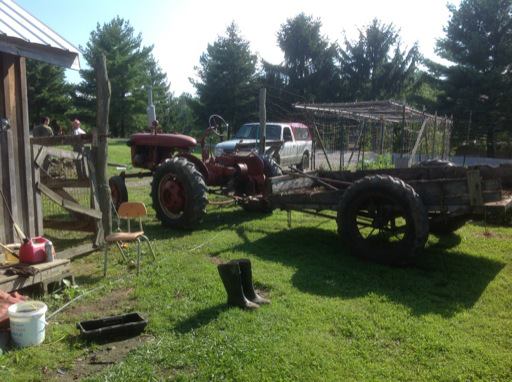
The Teaching Garden is an example of small-scale biodiversity, empowering the local community with local food culture. The tillers of the Garden offer workshops and tours which explains the ABCs of organic farming in relation to small-scale backyard gardening, market gardening, or the art of selling and preserving organic produce, and mini-farming, growing a wide array of foods for the local community without capital-extensive, external inputs.
The Garden also has a strict reuse, recycle, and restore ethic in relation to our mechanical assistants. Hence our trusty tractor, which has been in operation since the 1940s.
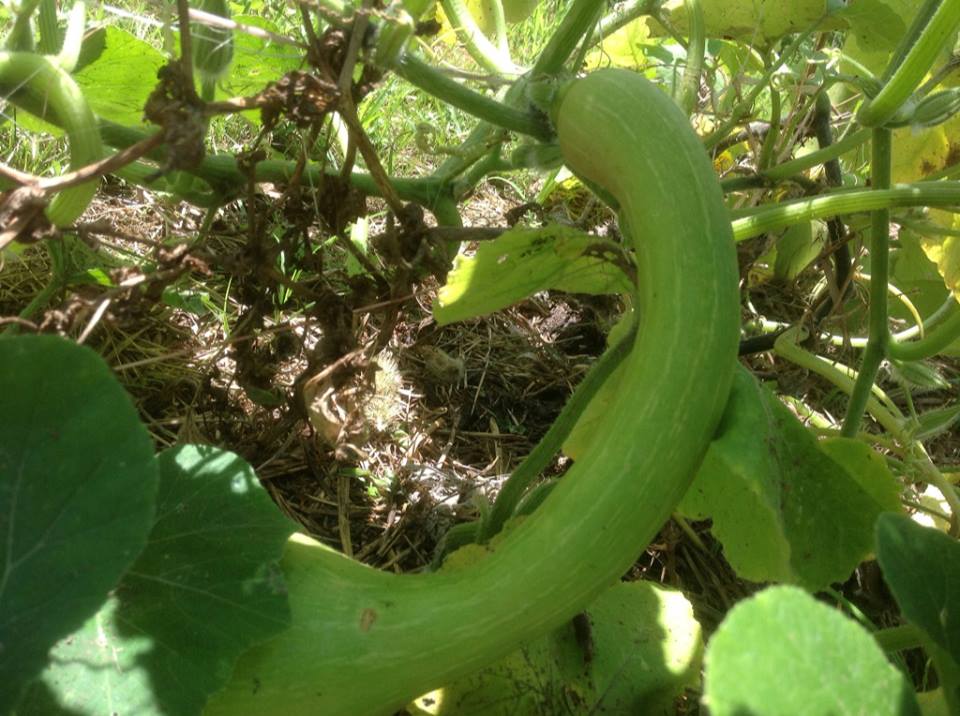
Tromboncino squash, which is resistant to squash bugs. Take that Monsanto!
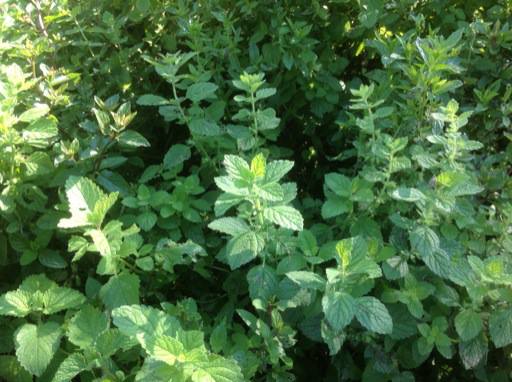
Our mint collection includes lemon-mint, chocolate mint (which tastes like a York peppermint pattie), peppermint, and spearmint.
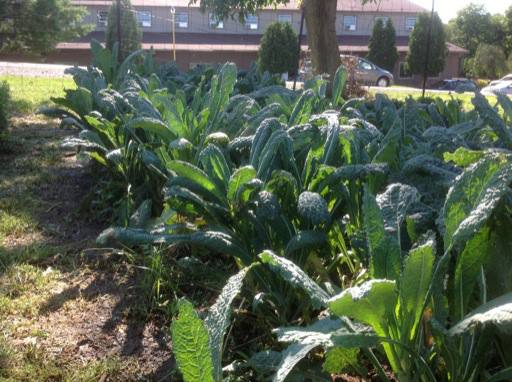
Dinosaur kale, whose dark-green leaves have a delicious nutty texture and remain firm in texture when cooked.
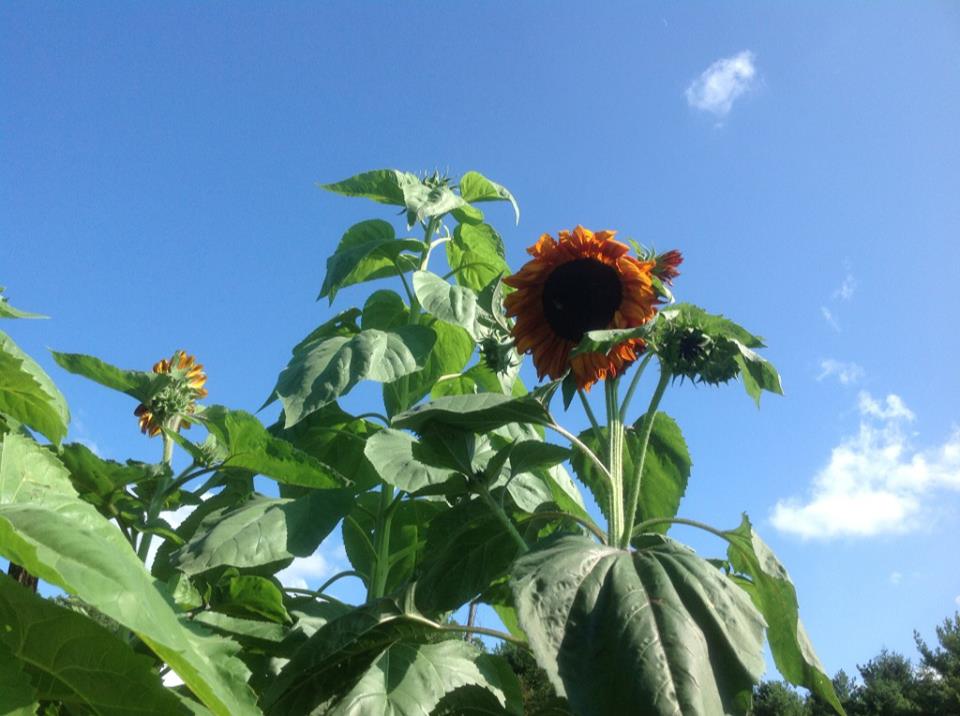
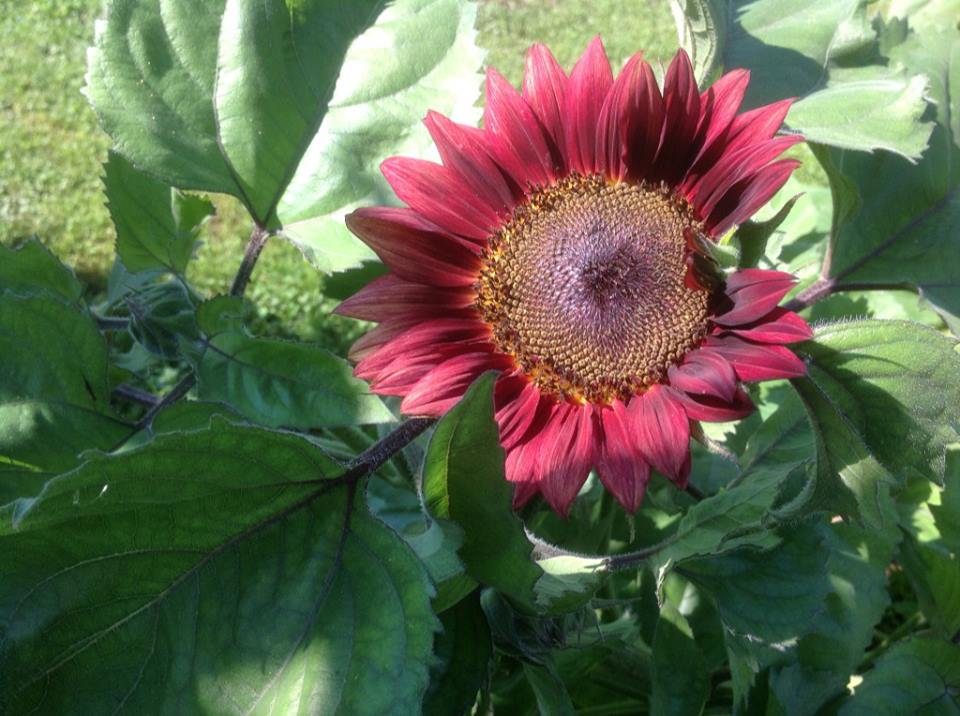
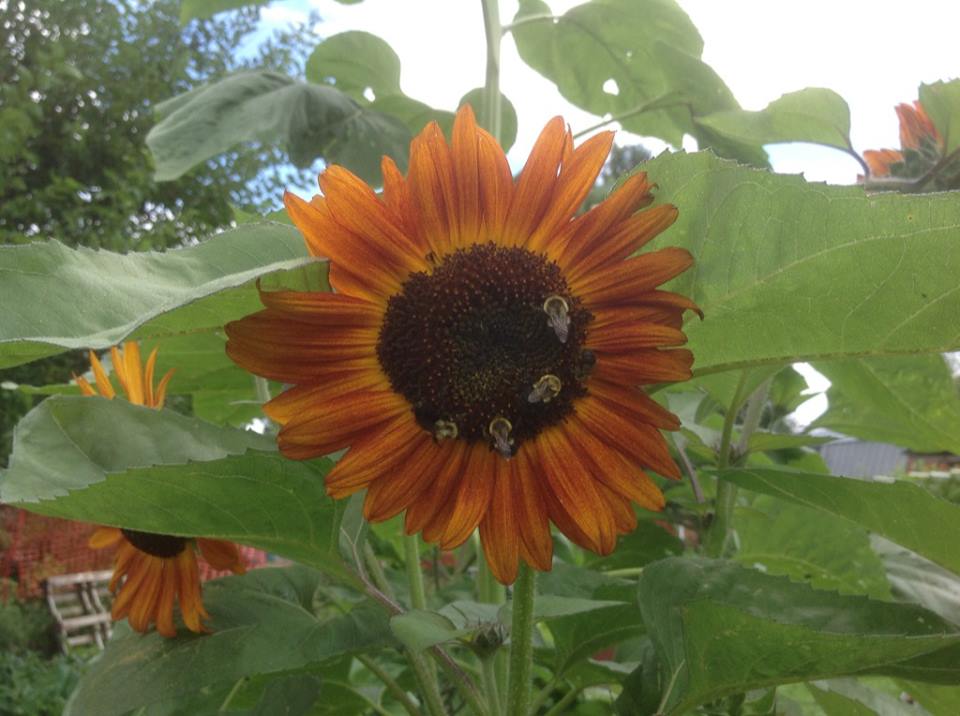
Some of the Garden's resident sunflowers. Nectar for the eyes and soul.
Friday, August 2, 2013
A Day In The Life of the Green Wheeling Initiative
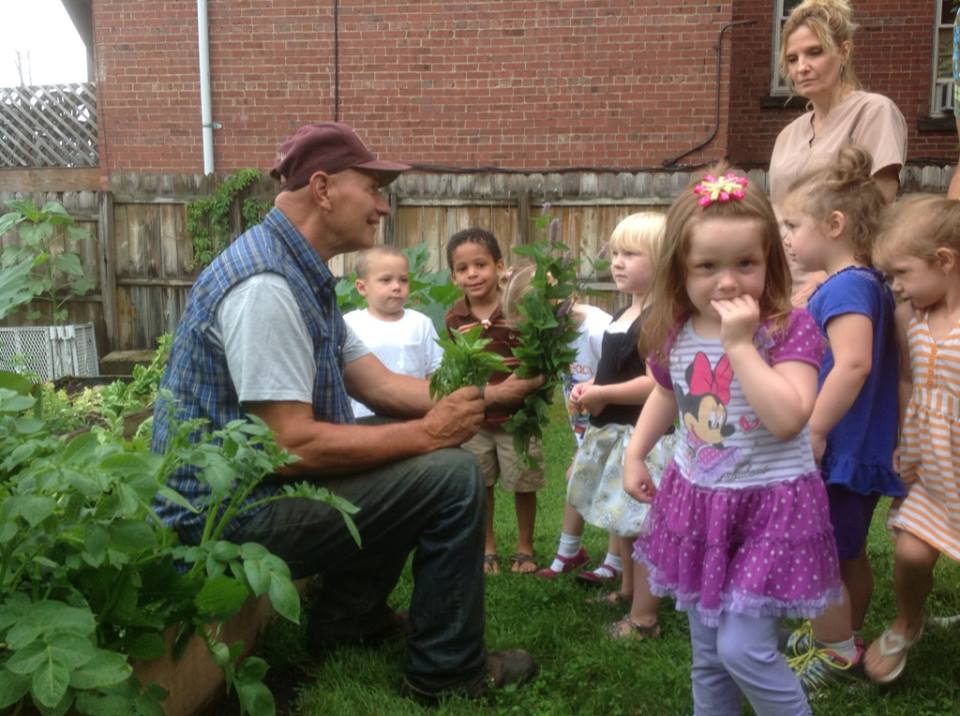
In my previous "Yoga of Ecology" post, I shared the truly brilliant and compassionate work of the Green Wheeling Initiative (GWI), a grassroots ground-up local food movement in Wheeling, W. Va. The GWI is helping the diverse peoples of Wheeling to reclaim their backyards and the bounties in their backyards through community gardens, cultural workshops, grant programs, and campus ecology events, amongst much else.
Terry Sheldon, one of the co-founders of the GWI, explains in an article on the GWI in the local Wheeling Intelligencer that "in a very positive way, we are trying to provide an alternative food system that creates a healthy environment for Wheeling. We're convinced through local partnership that we can create a local food economy around the issue of food that are grown by and consumed by people in the Wheeling area."
It is a project at the forefront of the just sustainability movement, which bridges the gaps between the environmental justice and the sustainability movements. In my eco-theology studies at Union Theological Seminary in New York, I was introduced to the conflict between the environmental justice (EJ) movement and the sustainability movement. Critics of the EJ movement may say that the work of EJ groups are too human-centric in their focus. They may argue that by being overtly focused on insuring justice for people in largely impoverished and marginalized communities, on insuring freedom from pollution and toxicity being dumped in their backyards, the EJ movement fails to fully acknowledge broader ecological issues involving non-human life/ life systems. Critics of the sustainability movement argue that by focusing overtly on these broader ecological issues, the gritty issues of incinerators and toxic waste being dumped in impoverished communities, and all the resultant health problems that come along with, are not given specific and proper attention, care, and concern.
The just sustainability movement can create an synthesis of concern and action that works to honor, correct, and improve the needs and lives of those who have been ecologically prejudiced against and marginalized, whether they are human or not. Julian Agyeman, EJ advocate and chair of the Department of Urban + Environmental Policy + Planning (UEP) at Tufts University, in his book Sustainable Communities and the Challenge of EJ, writes:
"Just sustainability highlights the pivotal role that justice and equity could and should play within sustainability discourses. In so doing, it fundamentally challenges the current, dominant, stewardship-focused orientation of sustainability, which has as its main concern the conservation of the natural environment, namely environmental sustainability...Transformative or just sustainability implies a paradigm shift that requires sustainability to take on a redistributive function. To do this, justice and equity must move center stage in sustainability discourses, if we are to have any chance of a more sustainable future."In spending time with Terry as an apprentice at his Small Farm Training Center in nearby Moundsville, W. Va., I've had the chance to see and experience the Green Wheeling Initiative first-hand and in action. Terry has introduced me to the very people who give life to the local food movement in Wheeling, who understand, despite being in the "belly of the beast" in West Virginia, where the poverty and obesity epidemics reign supreme, that they can reclaim the health and wealth in their own backyards.
Here is a photo essay of a day in the life of the Green Wheeling Initiative, and we hope you are inspired to share what is going on here and that it inspires you in your own just sustainability efforts.
A DAY IN THE LIFE OF THE GREEN WHEELING INITIATIVE
Every Tuesday Terry brings in at least eight boxes of swiss chard, or "West Virginia spinach" as the locals like to call it, to various soup kitchens in the Wheeling area, such as Catholic Charities Neighborhood Center and the Soup Kitchen of Greater Wheeling. Terry hopes that his contributions can be an encouragement towards integrating organic and local food, as an alternative to processed foods, into the serve-outs, food-boxes, and meals on wheels that make up the local charity networks.
Our journey on this Tuesday begins somewhat ominously, as Terry takes a shortcut on a dirt road through one of the local coal mines. He tells me that the coal residue on the road is highly toxic yet there is no regulation for its safe disposal, if such a thing exists. He tells me that the air in this part of the country is dirtier, because of the coal residue, than it is in my home locale of Manhattan.
One of the first aspects of the GWI that Terry showed me was the community gardens in some of the local schools in the Wheeling area. The challenge is to scale up, to find a way to integrate a garden into student bodies with hundreds of students, giving them each some little plot of investment. But the raised bed gardens at these schools are a good head start, creating a momentum and flow that could grow into something quite nourishing. The GWI has community gardens in four elementary schools, one preschool, and two universities in the Wheeling area.
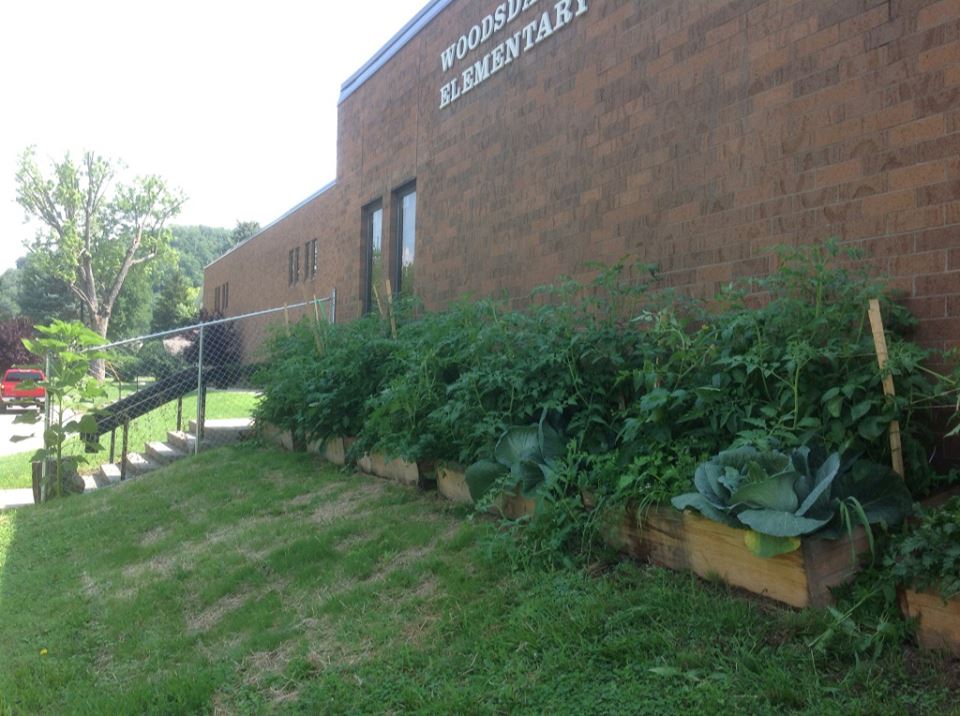
The community garden at Woodsdale Elementary in Wheeling.
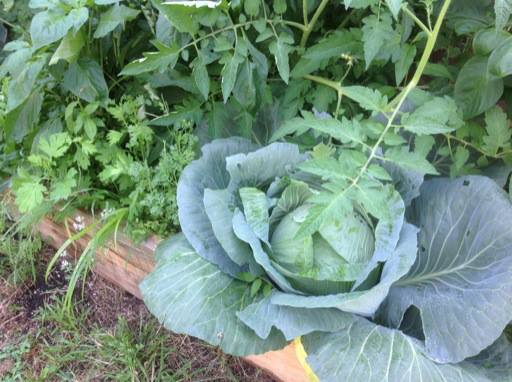
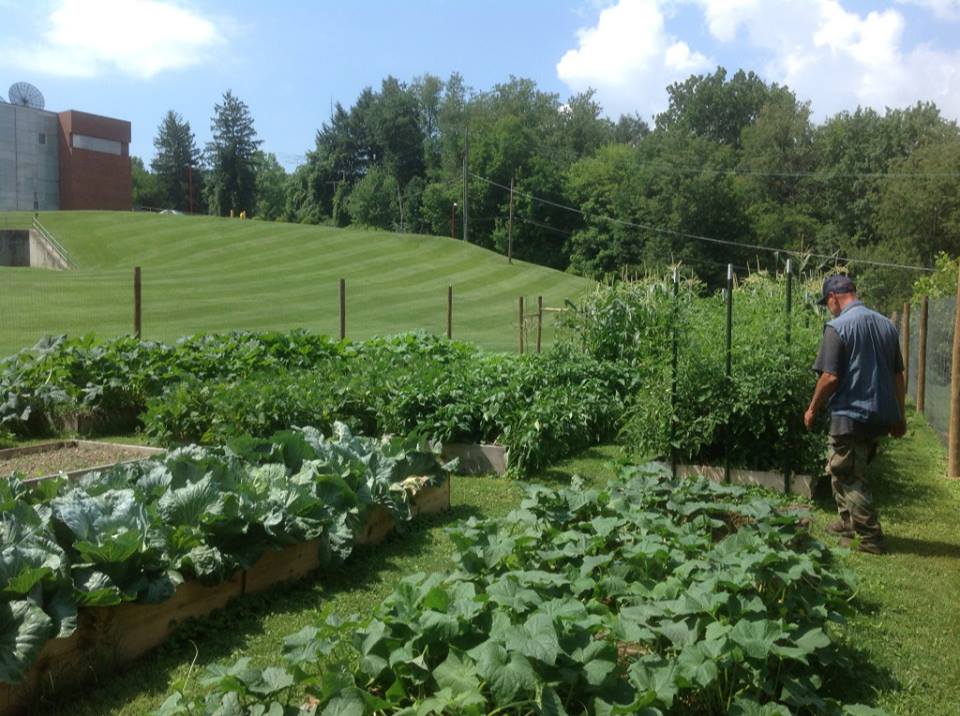
The community garden at Wheeling Jesuit University

Corn as high as an elephant's eye at Wheeling Jesuit
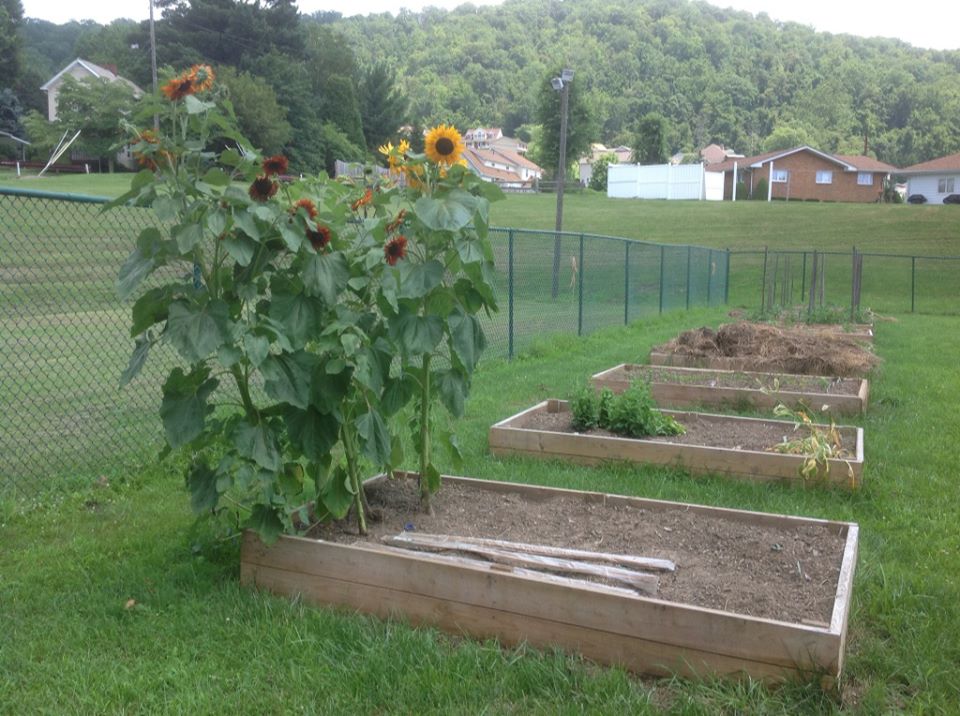
Raised bed community garden at McNinch Primary in Moundsville, WV
We next moved on to the 18th Street Overpass Garden, which we mentioned in our previous piece as being the epitome of the potential for urban agriculture.
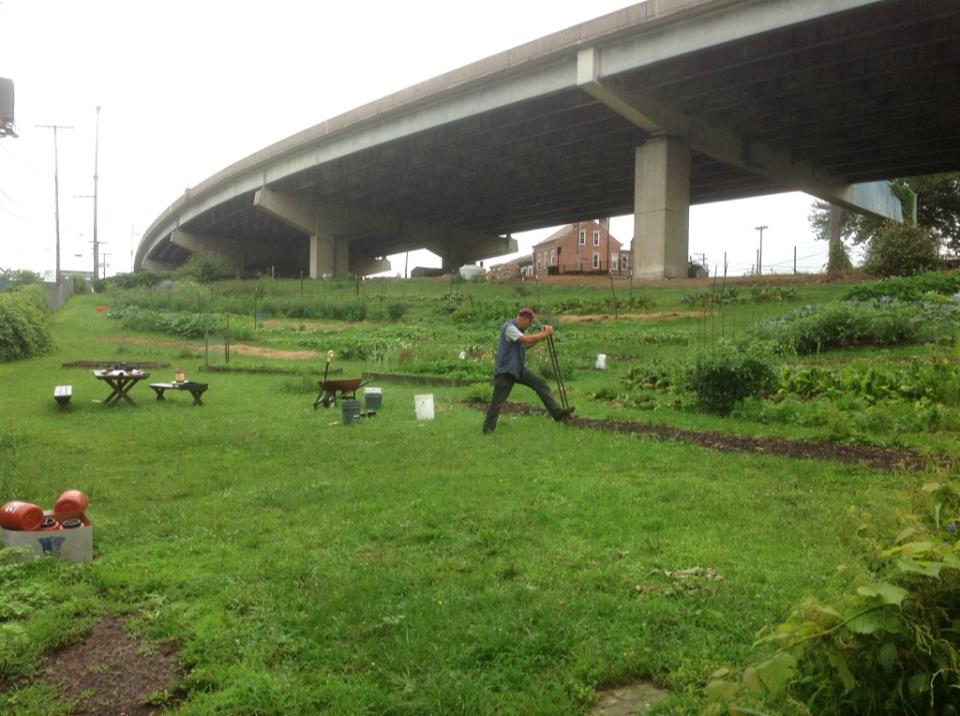
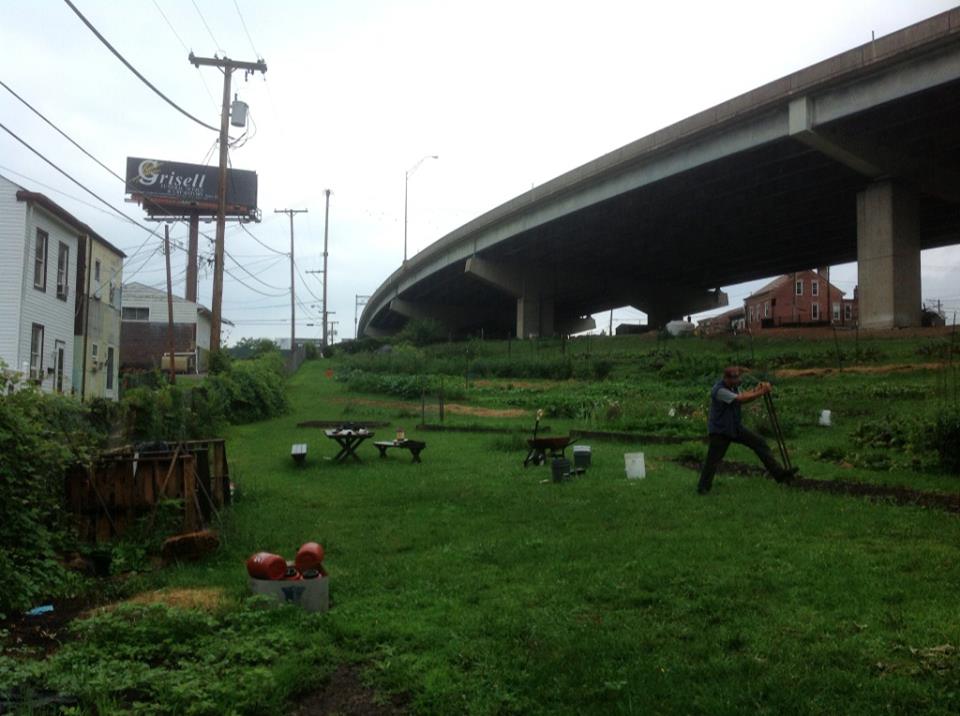
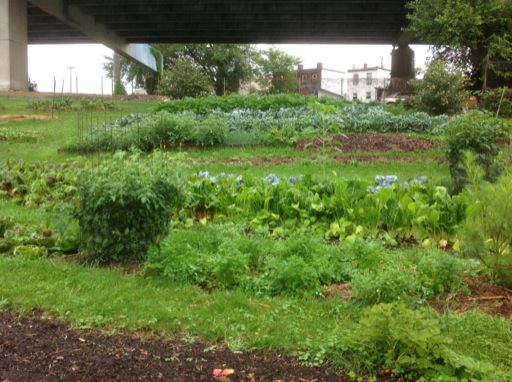
The GWI holds workshops for the local community and envisions a culture around the Overpass Garden which would include regular block parties and vegetable carts that could travel into the surrounding blocks and sell vegetables from the garden to the local residents, which would keep money in the community.
The Overpass Garden is a fore-runner of the green-collar economy, of retrofitting urban environments for urban gardening and farming. Like similar projects in other blighted locations such as inner-city Detroit, the Overpass Garden shows how community and ecology can be re-born in the ashes of the "American Dream."
The next place we came too was where the Green Wheeling Initiative originally came into being: West Virginia Northern Community College (WVNCC), in downtown Wheeling. One of the founders of the GWI, Gene Evans, was a professor in the Culinary Arts program at WVNCC and helped inspire the founding of the Culinary Arts Garden on the campus.
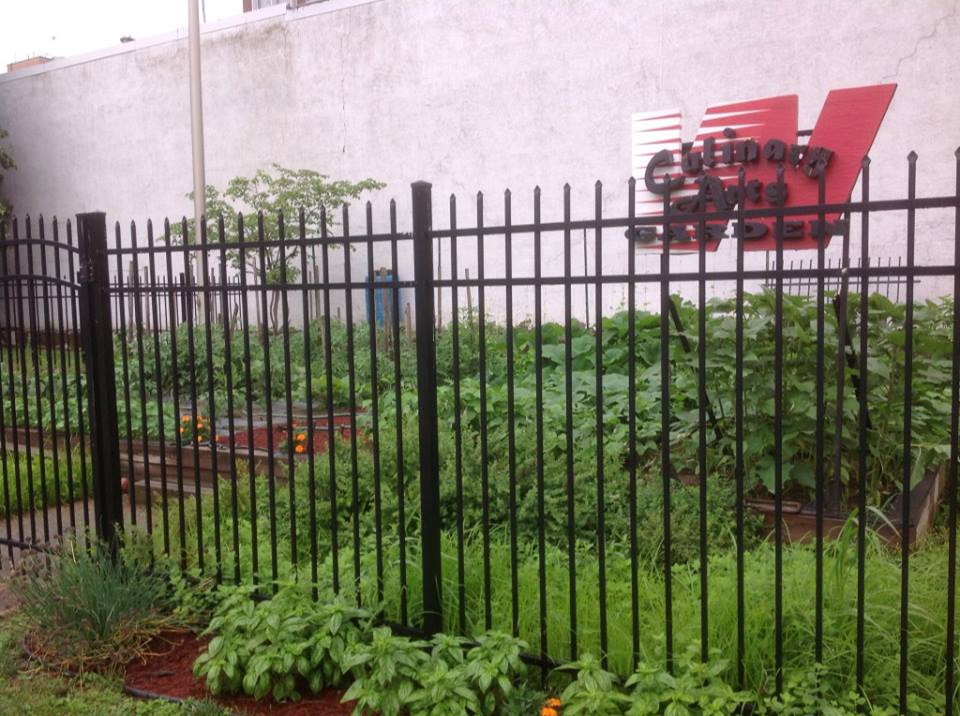
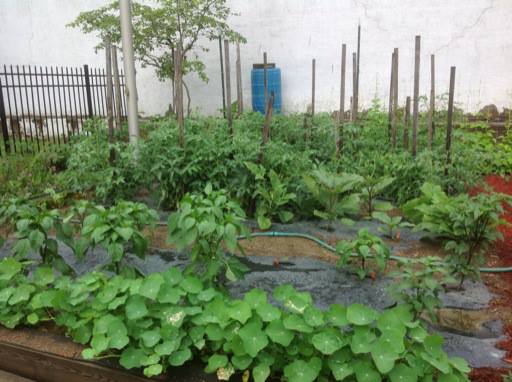
Terry tells a wonderful story of his own initial connection with WVNCC. Participating in the annual Harvest Fest which takes place on the campus, he met a member of the community who was very piqued by his presentations on local ecologically and economically sound food culture. When Terry told her his vision of making organic food fully affordable to the people of Wheeling, she was moved to tears. It so happens that this woman is the wife of Martin J. Olshinsky, the president of WVNCC. Soon after, over fifty culinary arts students from WVNCC toured Terry's Small Farm Training Center project.
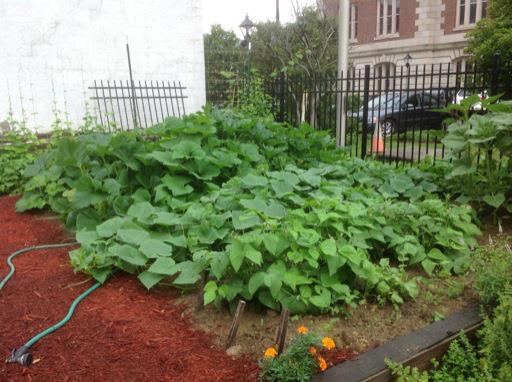
The GWI hopes to inspire, via the Culinary Arts Garden, a new curriculum within the Culinary Arts program at WVNCC which would focus on helping students become advocates and activists for the local food culture in Wheeling. The idea is that this program would empower the students with knowledge of how to grow, cook, find, and share local foods in the Wheeling area.
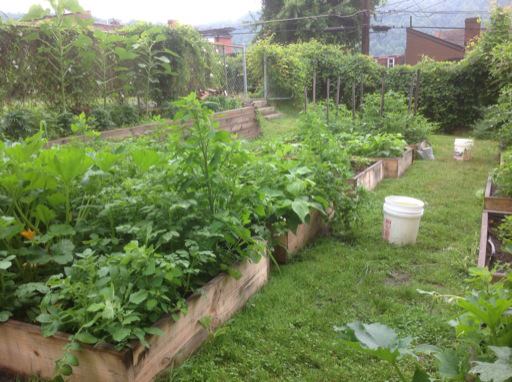
We next visited the raised bed gardens of King's Daughters Child Care. The garden is full of peppers, zucchini, potatoes, sunflowers, and much more. Over the past three months Terry has held 13 mini-workshops for the preschoolers who attend the child care program. Besides the tremendous amount of loving hilarity that comes along with interacting with these precocious personalities, Terry hopes to provide an example of how gardening can be integrated into the lives of all people in Wheeling, from preschoolers to wise old sages.
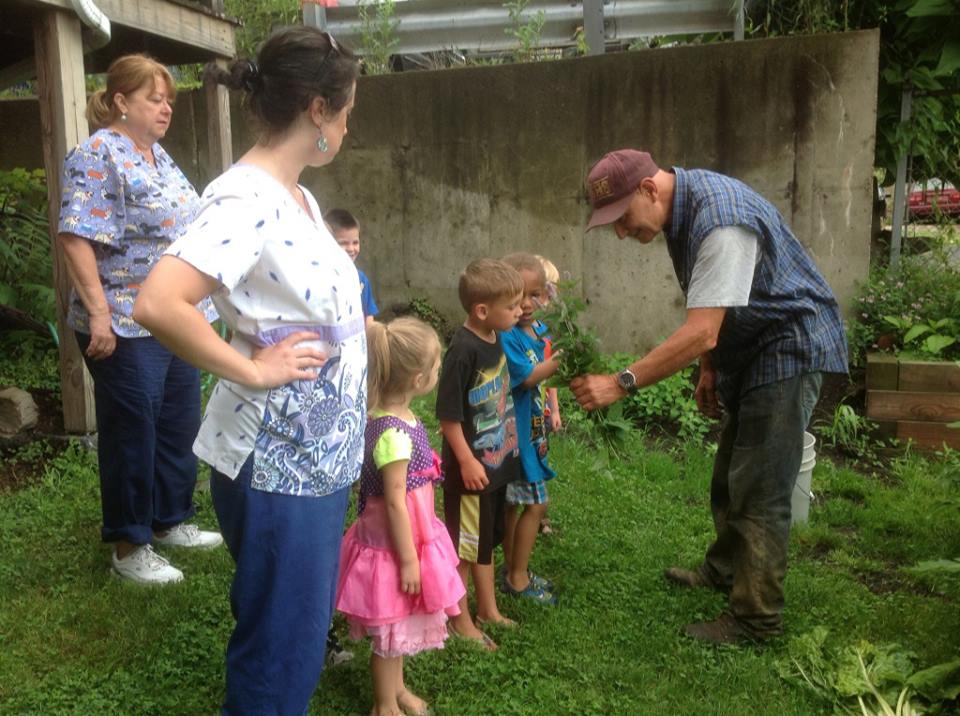
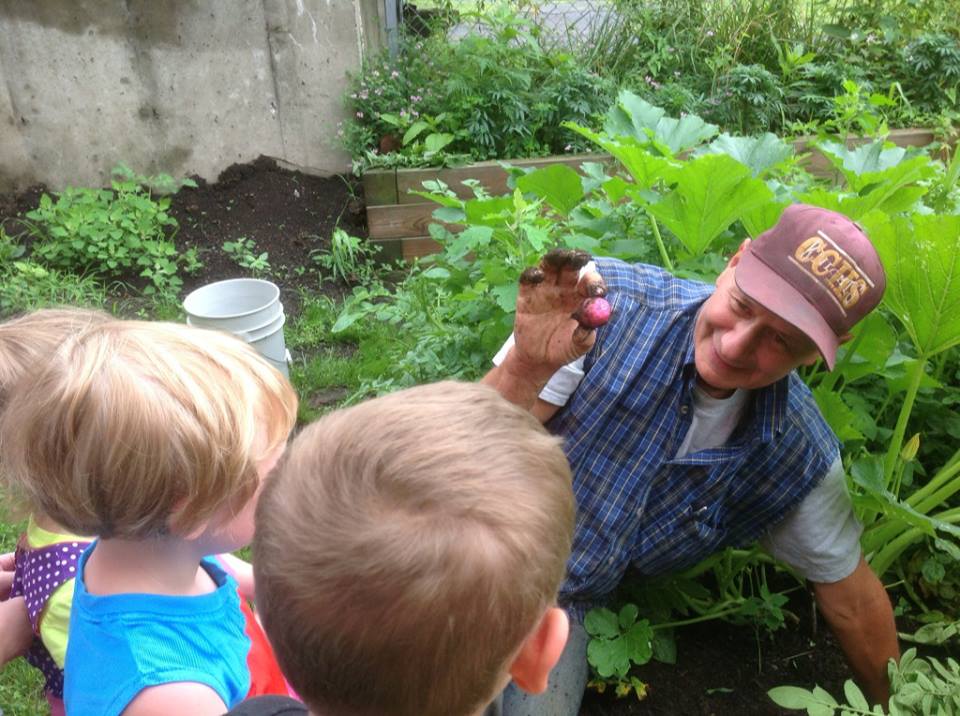
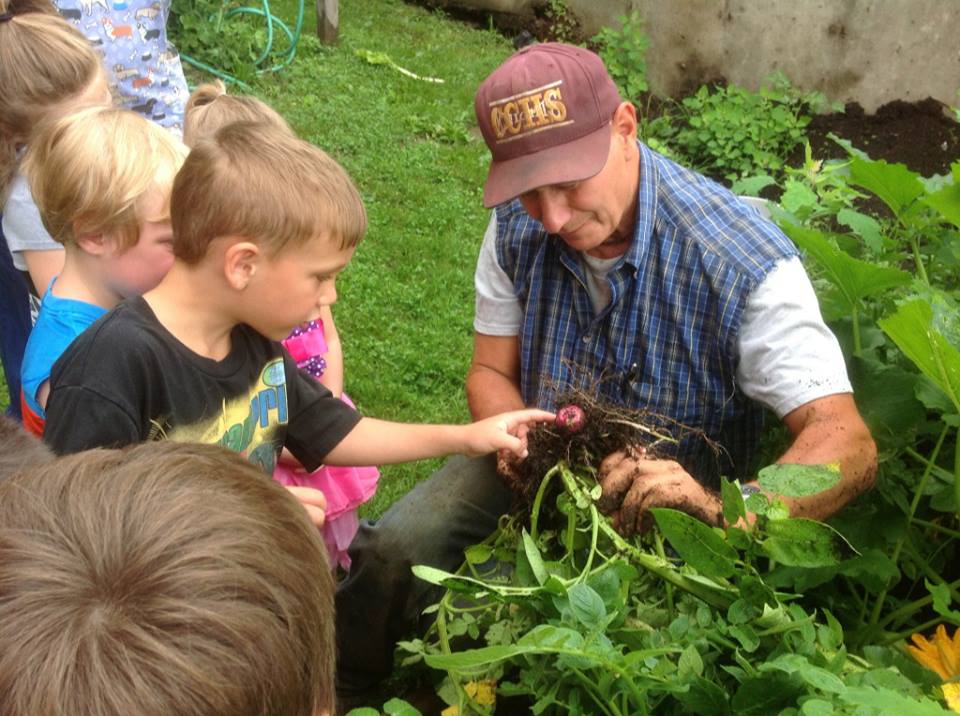
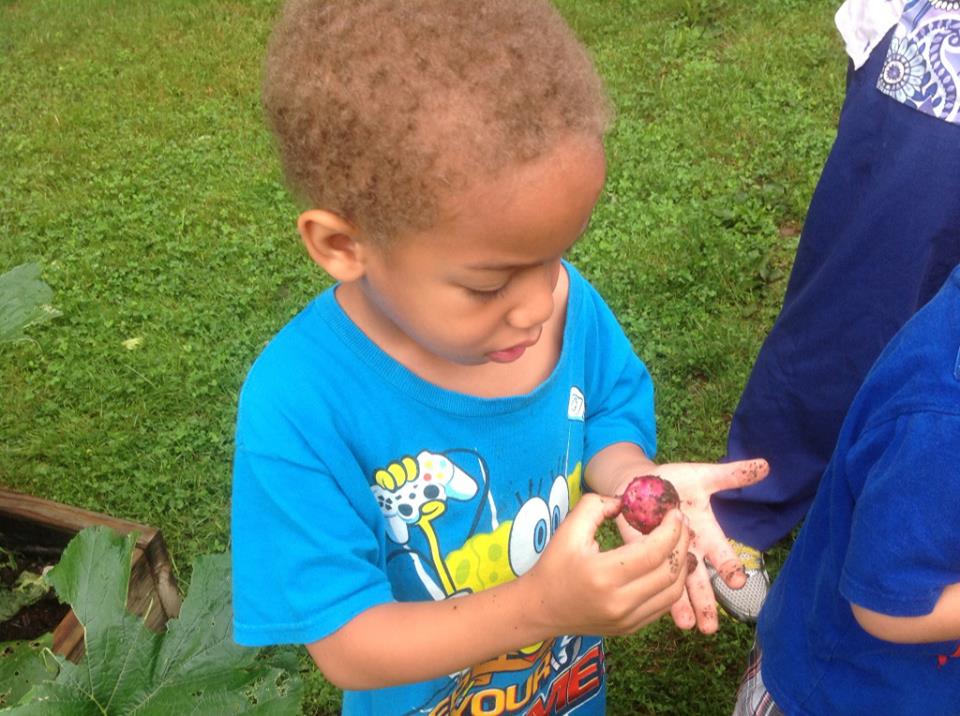
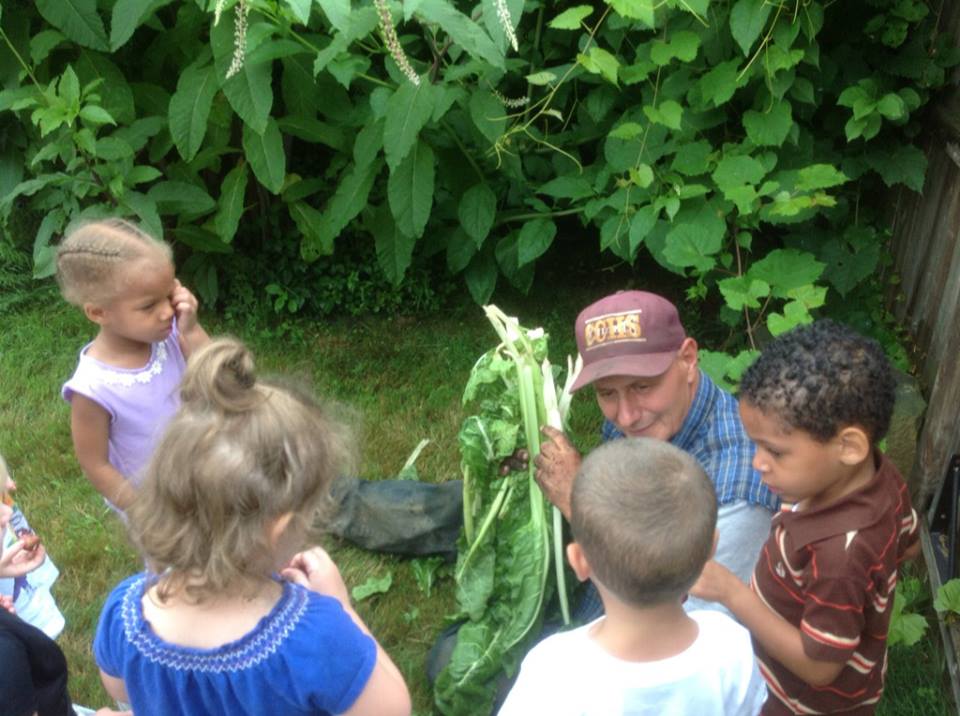
A hands-on experience for the kids in picking swiss chard (or "West Virginia spinach") leaves off their stalks
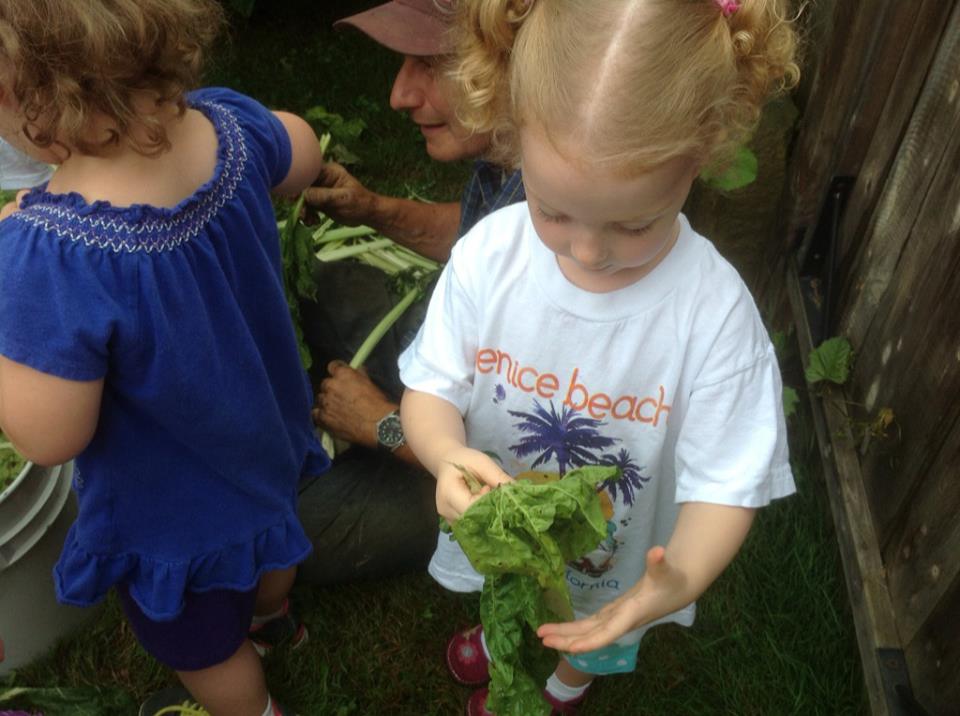
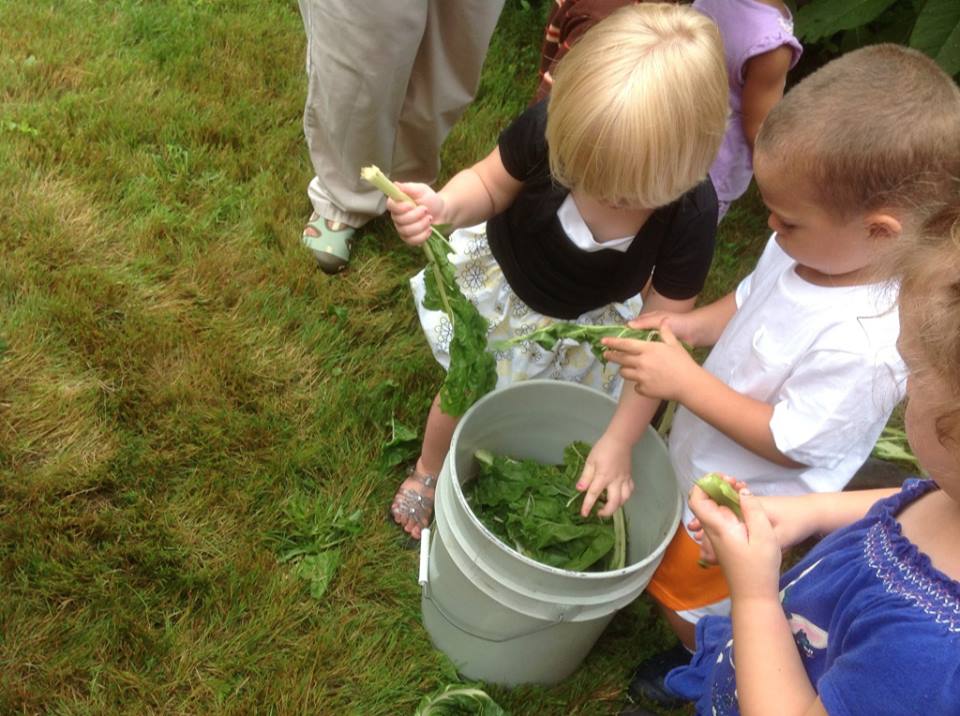
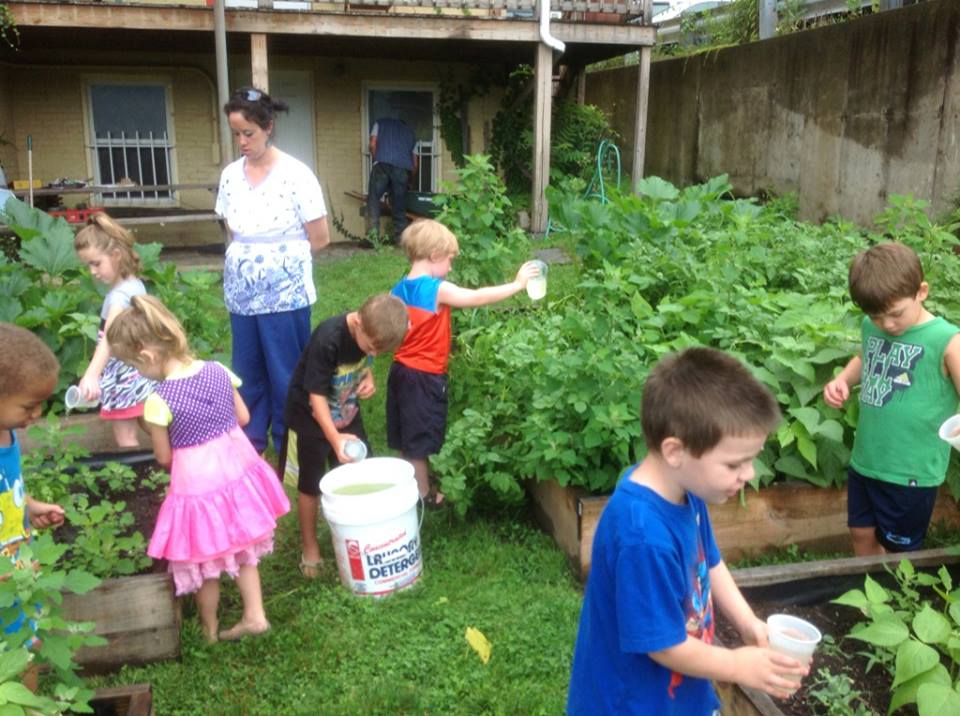
The kids favorite part of the mini-workshop: getting to water the garden...
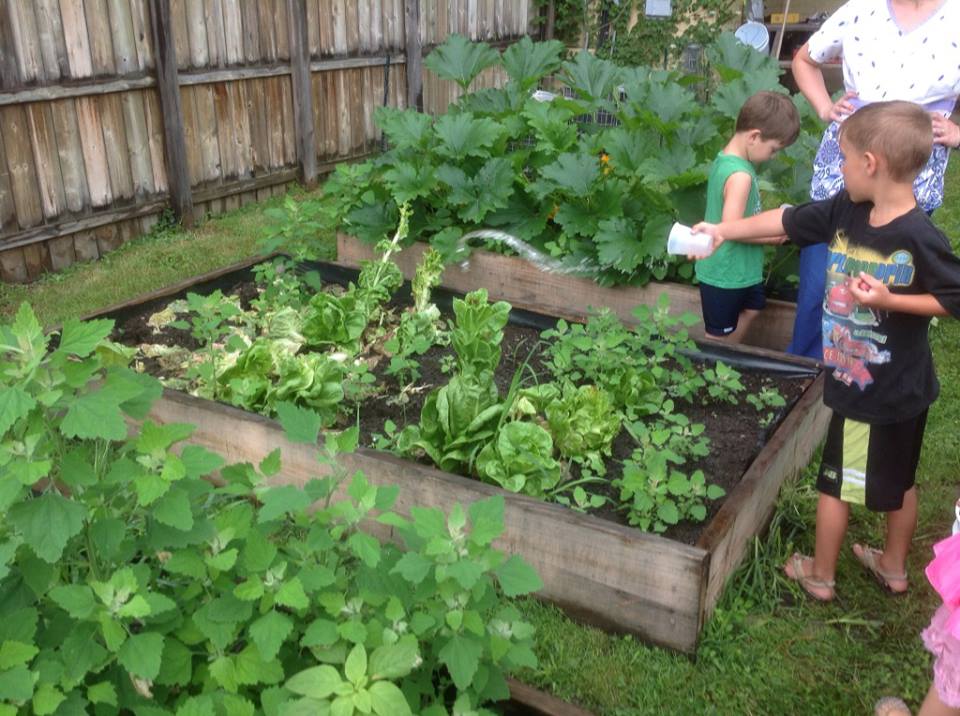
...and they have some pretty unorthodox watering techniques
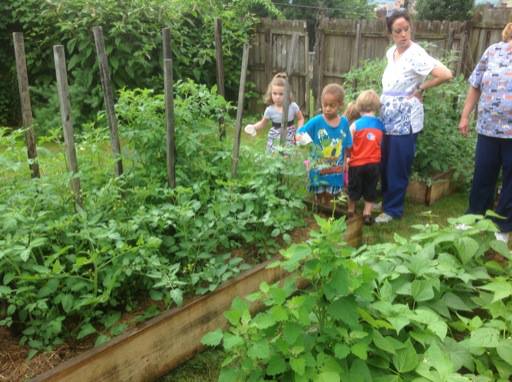
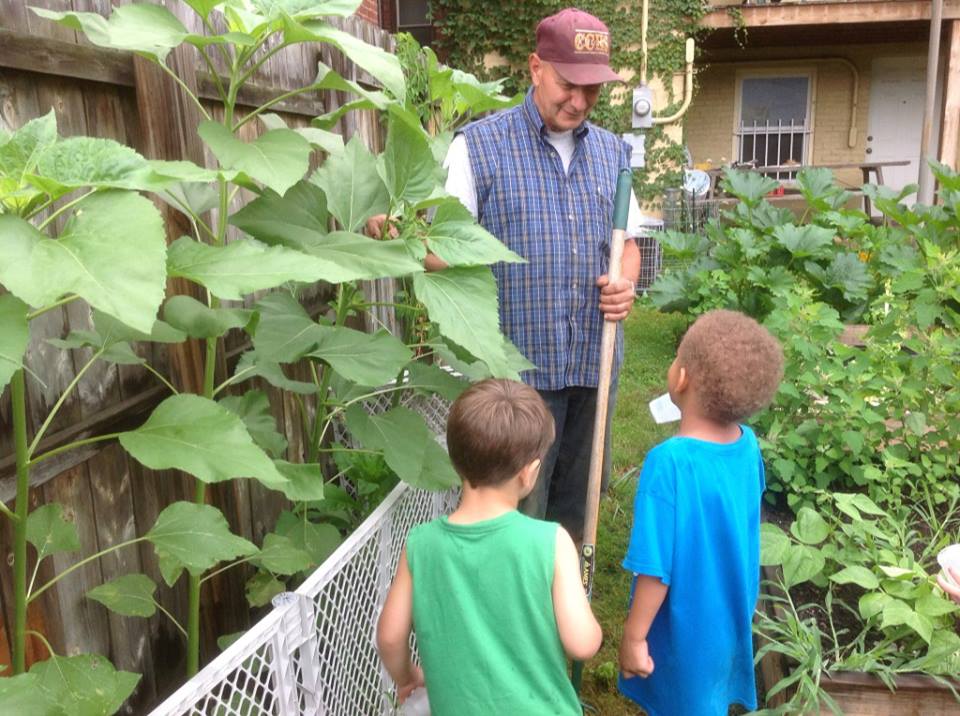
On Wheeling Island is the Island Rats Community Garden, with 25 raised beds and active patronage from members of Wheeling television and media.
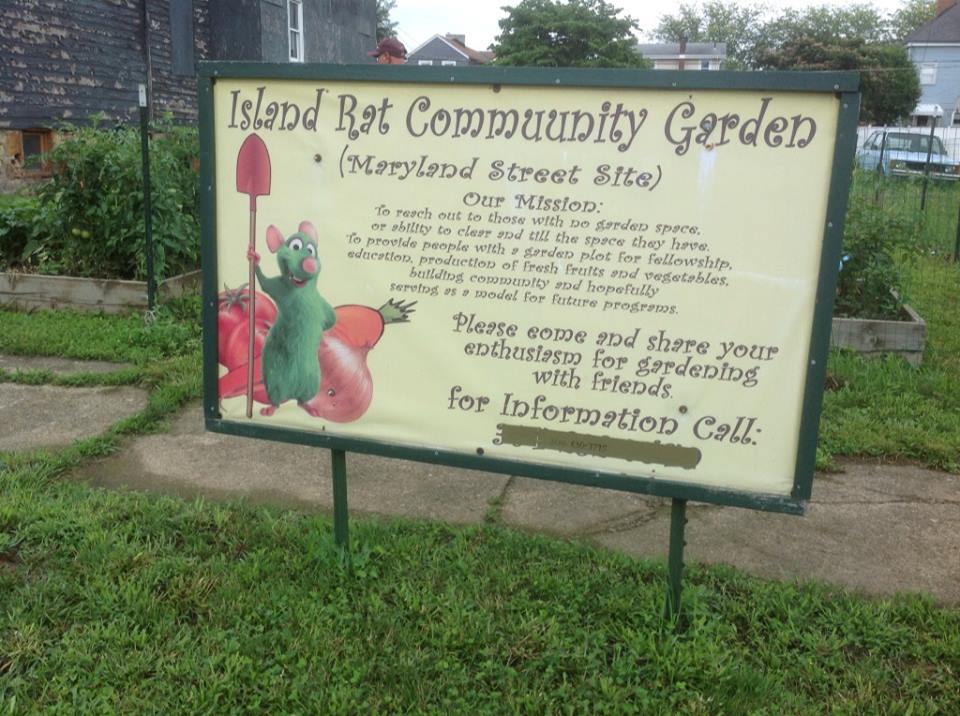
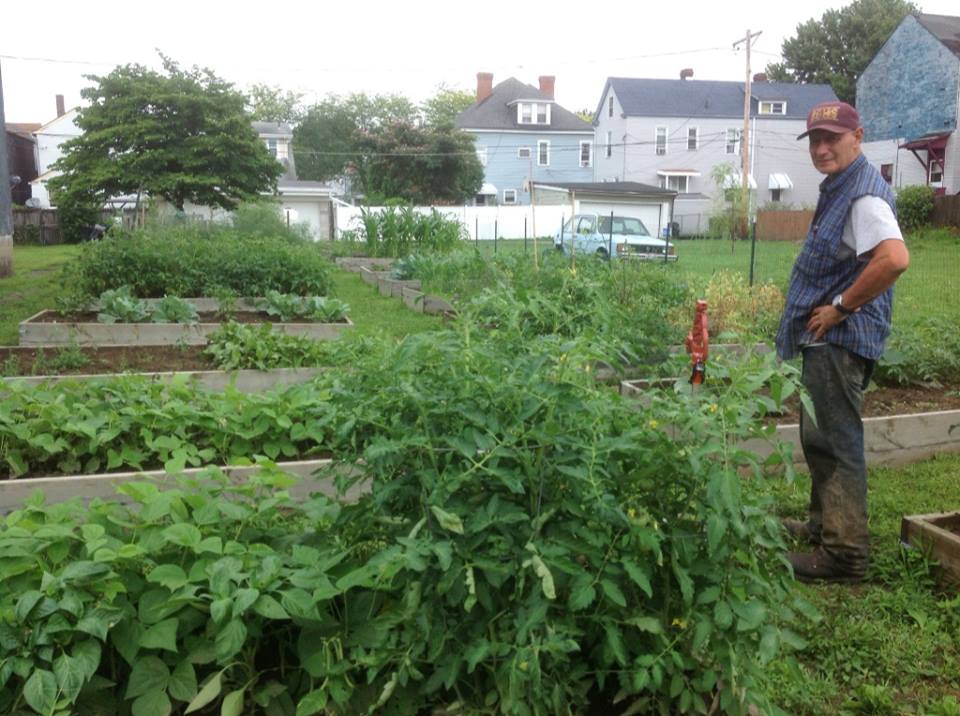


Last and certainly not least, we visited the home of Shannon, a house-mom with five kids and a husband who is an over-qualified coal miner with bigger dreams. Shannon has offered to become one of the main caretakers of the community garden at McNinch Primary. Terry and I were very impressed with her commitment to making sure her kids were given as much fresh and healthy food as she could possibly cook. It is moms like Shannon who in many ways are the real cutting-edge of the local food movement not only in Wheeling, but around the globe.
Quoted once again in the Wheeling Intelligencer, Terry speaks about Wheeling living up to its real potential. "It makes the tagline of 'The Friendly City' very real. Farming is not solemn work that you do all by yourself just to feed your family. The joy of farming, the joy of gardening is when it's done as a cooperative effort. We're trying to create a culture in which people want to work together."
Click here to listen to Terry's interviews on the Green Wheeling Initiative and the Small Farm Training Center with West Virginia Public Broadcasting.
The Green Wheeling Initiative on Facebook
Subscribe to:
Comments (Atom)






